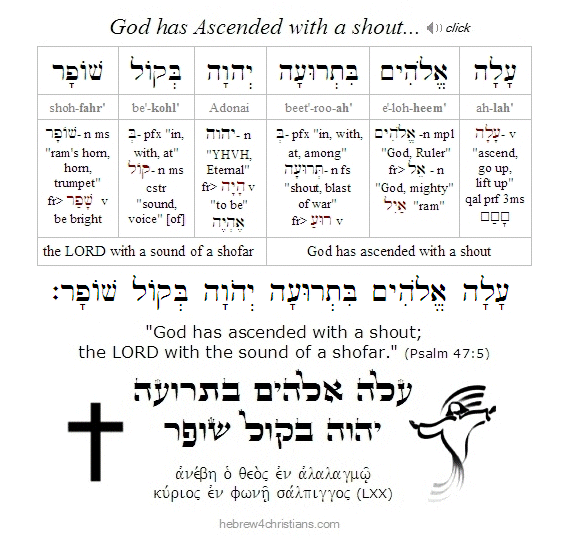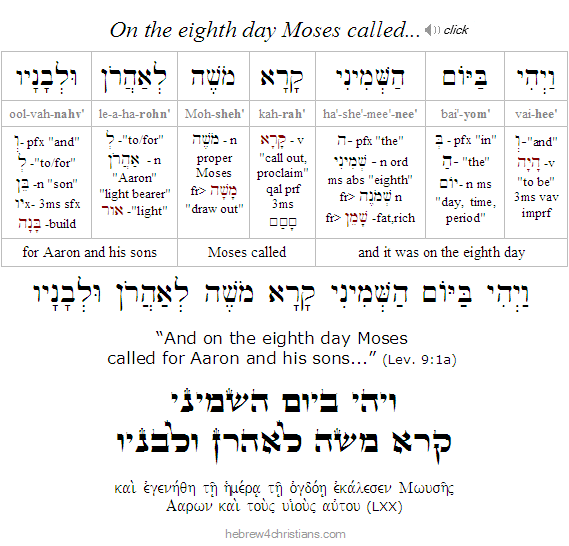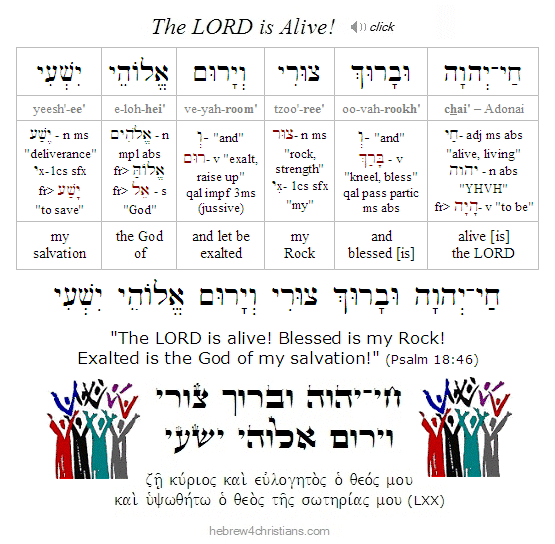|
Jewish Holiday Calendar
For April 2023 site updates, please scroll past this entry....
The Torah divides the calendar into two symmetrical halves: the Spring and the Fall, indicating the two advents of Messiah. The Biblical year officially begins during the month of the Passover from Egypt (called Rosh Chodashim, see Exod. 12:2), and the spring holidays of Passover, Unleavened Bread, and Firstfruits both recall our deliverance from Egypt and also our greater deliverance given by means of the death, burial, and resurrection of the Messiah, the great Passover Lamb of God. The holiday of Shavuot (i.e., "Pentecost") both commemorates the revelation of the Torah at Sinai as well as the revelation of the Ruach HaKodesh (Holy Spirit) at Zion, in fulfillment of the promise given by our Lord....
The intermediate months of summer end with the advent of the sixth month of the calendar, the month of Elul, which recalls the time Moses interceded on behalf of Israel after the sin of the Golden Calf. To commemorate this time of our history, we likewise focus on teshuvah (repentance) in anticipation of Rosh Hashanah and especially in anticipation of Yom Kippur, the great "Day of Atonement." In Jewish tradition the 30 days of Elul are combined with the first ten days of the seventh month (called the "Days of Awe") to set apart "Forty Days of Teshuvah" leading up to the Day of Forgiveness for Israel. Immediately following Yom Kippur, the mood changes as we begin preparing for a joyous week-long celebration called Sukkot (i.e., "Tabernacles") that concludes with the holiday of Simchat Torah.
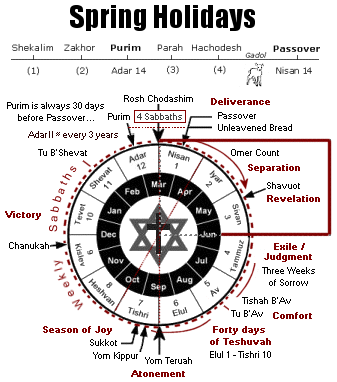 |
The Spring Holidays:
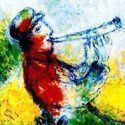
The spring holidays (חגי האביב) provide a portrait of the death, burial, and resurrection of the Messiah: Yeshua was crucified on erev Pesach (during the time of the sacrifice of the Passover lambs), buried during Chag Hamotzi (the festival of Unleavened Bread), and was resurrected from the dead on Yom Habikkurim (the Day of Firstfruits). Fifty days after Passover, on the climactic holiday of Shavuot (i.e., the feast of Pentecost), the Ruach HaKodesh (Holy Spirit) fell on the believers in fulfillment of the promise given by our Lord. Note that the giving of the Holy Spirit occurred precisely according to the calendar countdown given in the Torah (Lev. 23:15-16), and that it occurred after the resurrection of Yeshua -- just as our Messiah foretold (John 16:7; Acts 1:6-8, 2:1-4). This proves that the feasts of the LORD (מוֹעדי יהוה) were not abolished after the crucifixion. The meaning of the gospel is prefigured in the holidays given in Torah. See Luke 24:27, 24:44; John 5:46; Acts 26:22, etc.
![Spring Holiday Timeline (H4C]](../../../../About_HFC/Site_News/Archive-2023/roshchodeshim-line.gif) |
Kindly note that in accordance with both Torah and Jewish tradition, the following holiday dates begin at sundown (ויהי־ערב ויהי־בקר; Gen. 1:5):
- Month of Adar (Mon. Feb. 20th [eve]) - Wed. March 22nd [day])
Dates for Passover Week 2023:
Free Seder Guide
- Month of Nisan (Wed. March 22nd [eve]) - Thurs. April 20th [day])
- Month of Iyyar (Thurs. April 20th [eve] - Sat. May 20th [day])
- Month of Sivan (Sat. May 20th [eve] - Sun. June 18th [day])
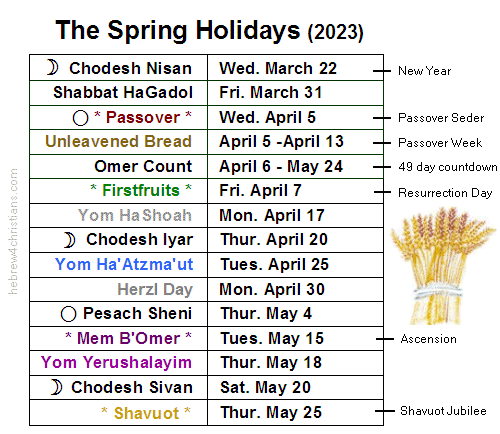 |
Note: For more information, see the Calendar Pages....
April 2023 Updates
Note: Please refresh the page (or press F5) to see the latest updates...
Parashat Emor - אמור

04.30.23 (Iyyar 9, 5783) שָׁלוֹם לְכוּלָם - Shalom le'khulam! Our Torah portion for this week (i.e., parashat Emor) lists the eight main holidays explained in the Jewish Scriptures. In the Torah, these "holidays" are called "appointed times" (i.e., mo'edim: מוֹעֲדִים), a word which comes from the Hebrew root meaning "witness" (עֵד). Other words from this root include edah (עֵדָה), a "congregation," edut (עֵדוּת), a "testimony," and so on. The related verb ya'ad (יָעַד) means "to meet," "to assemble," or even "to betroth." The significance of these set apart or "holy" days, then, is for the covenant people of the LORD to bear witness to God's ongoing love and faithfulness. As it is written: "All the paths of the LORD are compassion and truth to those keeping his covenant and his testimonies" (Psalm 25:10).
Hebrew Lesson
Psalm 25:10 reading (click for audio):
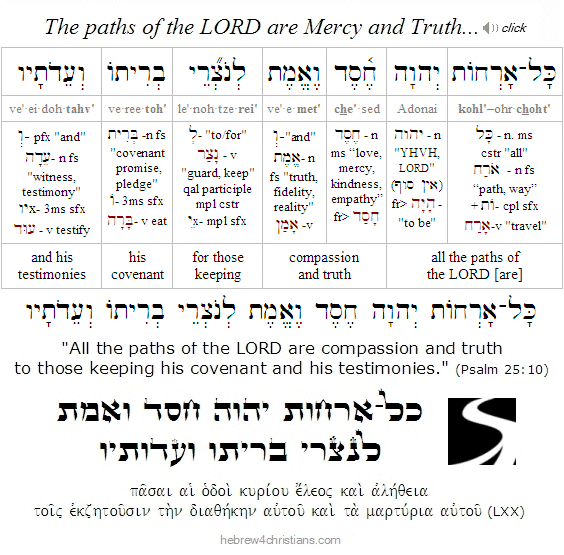 |
Metaphorically the "paths of the Lord" (i.e., orechot Adonai: ארחות יהוה) are likened to ruts or grooves created by the wheels of a caravan (i.e., orechah: ארְחָה) passing repeatedly over the same ground. These paths signify the Divine Presence journeying with God's children in this world. In temporal terms, we are able to discern the path by means of the divine calendar. God's love and faithfulness attend to His covenant (brit) and to the commemorations of the yearly "appointed times" that testify of God's faithful love. Keeping God's testimonies, then, means that we will be careful to observe the holidays in order to witness to God's truth...
"Speak to the people of Israel and say to them, 'These are the appointed times of the LORD (מוֹעֲדֵי יְהוָה) that you shall proclaim as holy convocations (מִקְרָאֵי קדֶשׁ); they are My appointed times'" (Lev. 23:2). Note that these hallowed times - the very first of which is the weekly Sabbath - are "of the LORD," and that means they should be regarded as appointments given by God Himself to help draw us closer to Him, to reveal His prophetic truth, and to remind ourselves of His great plan for our lives. God did not give us the Torah in vain, friends, neither does He speak out of two sides of his his mouth... Yeshua was the Voice of the LORD speaking the words of Torah to Israel at Sinai, and therefore every "jot and tittle" (קוֹצוֹ שֶׁל יוֹד) is indeed relevant to our lives as his followers (Matt. 5:18-19).
Keep the Flame Burning...

[ "Faith is the strength by which a shattered world shall emerge into the light." - Helen Keller ]
04.28.23 (Iyyar 7, 5783) Keep the flame within your heart burning, friend... A sage once told a person struggling with his faith: "It is written that all creation was brought into being because of people like you. God saw there would be people who would cling to our holy faith, suffering greatly because confusion and doubt would plague them. God perceived that such would overcome these doubts and troubles of heart and remain strong in their belief. It was because of this that God brought forth all creation." Indeed, it was because of this that Yeshua our LORD suffered and died for you... Amen. Therefore never yield to despair, since that leads to further darkness and fear. Press on and keep fighting the "good fight" of faith (1 Tim. 6:12). Remember that you infinitely matter to heaven; your life has great value; you are significant and you are truly loved by our Heavenly Father. There is a "future and a hope" for you; there is "a white stone, and on that stone will be written a new name that no one can understand except the one who receives it" (Rev. 2:17). May "the trial of your faith, being much more precious than of gold that perishes, though it be tested with fire, be found to result in praise and glory and honor at the revelation to come" (1 Pet. 1:7).
"I am sure of this, that he who began a good work in you will bring it to completion (ἐπιτελέω) at the Day of Yeshua the Messiah" (Phil 1:6). The LORD is able to guard you (φυλάξαι) from stumbling and to present you blameless before the presence of His glory with great joy (Jude 1:24). "The LORD upholds all who are falling and raises up all who are bowed down" (Psalm 145:14). "He will sustain you to the end, guiltless in the Day of our Yeshua the Messiah" (1 Cor. 1:8). He who calls you is forever faithful; He will surely do it (1 Thess. 5:24). Yea, "the Lord is faithful (נֶאֱמָן הוּא): He will establish you and guard you against the evil one" (2 Thess. 3:3). The Spirit says, "Fear not, for I AM with you always."
Hebrew Lesson:
Isaiah 41:10 Hebrew reading (click):
I appreciate this quote from the late Frederick Beuchner: "To be commanded to love God at all, let alone in the wilderness, is like being commanded to be well when we are sick, to sing for joy when we are dying of thirst, to run when our legs are broken. But this is the first and great commandment nonetheless."
It is true; we cannot possibly love God with all our hearts apart from a miracle of personal encounter with the risen Lord who calls us to know Him.
Human pride looks for reasons why God would reveal himself to us; it assumes there is something about us that commends his love. But the miracle of faith is a gift from above, since the only thing we can offer God is our need, our brokenness, and our powerlessness.
Some people trust in religion, but what matters most is disclosed as you lay dying on your bed, in your most needy moment for the intervention of God's grace. Is it not precisely then that when all human hope is lost, your heart reaches out to the utmost for the good Lord to come to your rescue? We are saved by hope (Rom. 8:24). אֵלֶ֥יךָ יְ֝הוָ֗ה נַפְשִׁ֥י אֶשָּֽׂא — "Unto Thee O Lord do I lift up my soul..." Amen. Bo, ruach Elohim!
 |
Numbered for Love...
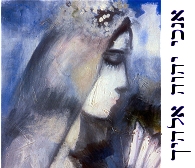
04.28.23 (Iyyar 7, 5783) "O Lord, teach us to die well. Reveal to us the great comforts of the gospel. Help us to step into eternity by surrendering our will and yielding ourselves completely to you, so that whether we live, we live unto you, and whether we die, we die unto you, and therefore whether we live or die we will forever belong to you...
Help us, then, to live in light of eternity, teaching us to number our days aright, so that we may attain a heart of wisdom (Psalm 90:12). Help us to know your Torah, O LORD. Each of us is a cripple, hobbling through our days; each a terminal case, stricken and appointed to one day die. Sanctify our pains, our fears, and our sorrows, that they may draw our hearts closer to you. Help us prepare for the coming day by attending to what is most essential - the heavenly treasure of being in your presence. Amen."
Hebrew Lesson:
Psalm 90:12 Hebrew reading (click):
Prophetic Significance of Israel...

[ The following is related to Yom HaAtzma'ut (יום העצמאות) - Israel's Independence Day. ]
04.28.23 (Iyyar 7, 5783) Can a case be made that we among the "terminal generation" before the return of Yeshua? The Torah predicted that the "End of Days" would occur sometime after the return of the Jewish people from their worldwide dispersion back to the land of Israel (see Deut. 30:1-3), and indeed the theme of exile and return is repeated in the prophets (see Jer. 23:3; 32:37-38; Ezek. 37:21, etc.). Therefore it is surely extraordinary that Israel was reborn as a nation in their ancient homeland on May 14, 1948 (Iyyar 5, 5708), after nearly 2,000 years of exile... Moreover, the existence of the modern State of Israel is entirely consonant with New Testament prophecies regarding the advent of the Messiah, since Yeshua taught that the Jewish people would indeed be in the land of Israel at the time of his second coming, and that the city of Jerusalem would be surrounded by enemies of the Jewish state (see Matt. 24-25; Mark 13, Luke 21). Furthermore, if we understand a "generation" to mean 70-80 years in duration (as stated in Psalm 90:10), then when Yeshua said, "this generation (ἡ γενεὰ αὕτη) shall not pass until all these things take place" (Matt. 24:34), he was perhaps referring to the generation that would originate with the restoration of the modern State of Israel, which further implies that Daniel's 70th Week (i.e., the Great Tribulation) could begin very soon. And while it is true that "no one knows the day or hour" of the "great day of the LORD" (יוֹם־יְהוָה הַגָּדוֹל), Yeshua faulted the scribes and the Pharisees for failing to discern "the signs of the times" (Matt. 16:3) and for missing the "time of their visitation" (Luke 19:44), and therefore are we likewise admonished to use discernment as we anticipate his second coming...
Hebrew Lesson
Isa. 66:8 reading (click):
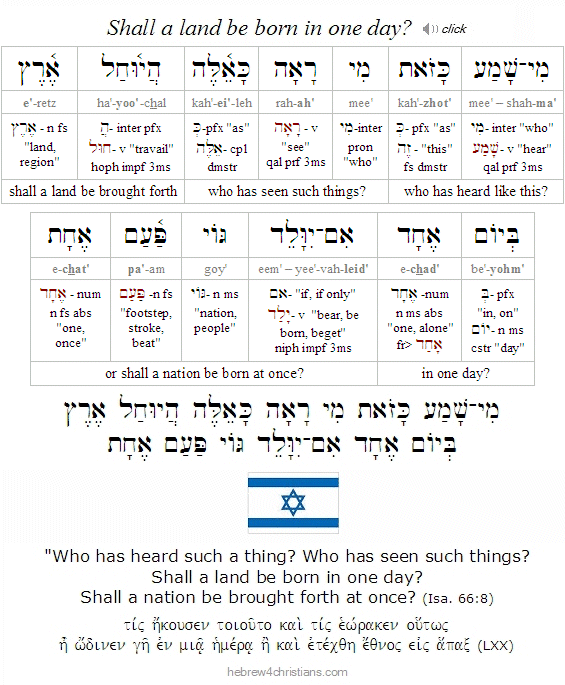 |
Am Yisrael Chai! - the people of Israel live! Like many other prophetic statements found in the Jewish Scriptures, this verse from the prophet Isaiah is "dual aspect," since it was both partially fulfilled when the Jewish people reestablished the State of Israel, but it will be entirely fulfilled at the outset of the Millennial Kingdom after the return of Messiah (see Isa. 66:7-16; Rom. 11:26). Meanwhile we behold the restoration of the "Fig Tree," and understand that the great harvest draws near, friends... May God help each one of us be awake, ready, with hearts full of steadfast faith (1 John 3:2-3; Titus 2:11-14; Matt. 24:32).
Regardless of how you may regard the prophetic events that herald the "end of the age," however, know this: Today might be your last in this world - your very own "Rosh Hashanah" when you will appear before the Judge and Creator of your life... Therefore should we live each day as if it were our last and pray that God will help us to serve Him in the truth.
Finally let me (preemptively) add that while we may discern that the time is indeed "short" and that the hour "draws near," I do not believe in "date setting" or predicting the return of the LORD, since that is "chokhmah nisteret" (חכמה נסתרת), "sealed wisdom," known only to the Father (see Matt. 24:36, Acts 1:7; 1 Thess. 5:2, etc.). Shalom.
 |
The Central Duty to Love...

04.28.23 (Iyyar 7, 5783) Our Torah portion this week, Acharei Mot, contains the verse, "You shall love your neighbor as yourself; I am the LORD" (Lev. 19:18), which is generally regarded as the most fundamental commandment of Torah. The Talmud recounts that when challenged by a pagan to teach the meaning of the Scriptures "while standing on one foot," Hillel said, "What is hateful to you, do not do to your neighbor: that is the whole Torah and the rest is commentary; go and learn it." Hillel summed up the Torah as "doing no harm" toward others (i.e., the "Silver Rule"), which agrees with the Apostle Paul's statement, "Love does no wrong to a neighbor; therefore love is the fulfillment (πλήρωμα) of the law" (Rom. 13:10). Of course Yeshua earlier taught His followers, "whatever you wish that others would do to you, do also to them, for this is the Law and the Prophets" (Matt. 7:12; 22:36-40).
Some of the mystics have said that when two people love one another, the Holy One reigns between them, as alluded to by the Hebrew word for "love" (i.e., ahavah: אהבה), the gematria of which is thirteen (1+5+2+5=13), but when shared with another it is multiplied: 13 x 2 = 26, which is the same value for the Sacred Name (יהוה), i.e., (10+5+6+5=26). In other words, when we love, esteem, and respect one another, the LORD's presence is multiplied and revealed among us (1 John 4:7-8). "Where two or three gather in my Name..."
Hebrew Lesson
Leviticus 19:18b reading (click):
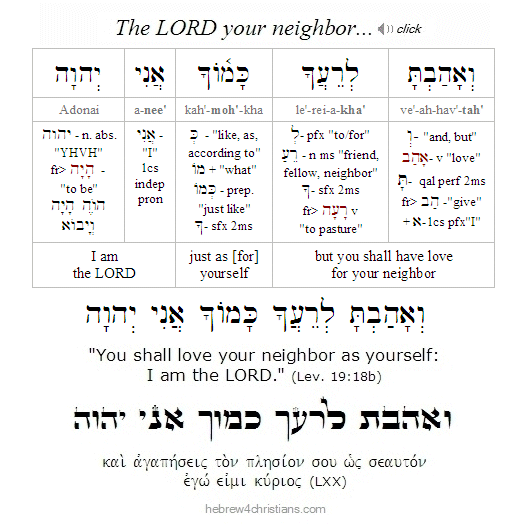 |
In this connection, it is interesting to note that the gematria for the Hebrew commandment, "You shall love your neighbor as yourself" (i.e., וְאָהַבְתָּ לְרֵעֲךָ כָּמוֹך) equals 820, the same value as the word yekidash'ti (וְקִדַּשְׁתִּי), "And I [the LORD] will sanctify" (Exod. 29:44). When God commands us to "love your neighbor as yourself," he graciously includes the addendum: "I am the LORD," which the sages say recalls the revelation of the Name YHVH (יהוה), and that therefore is understood to mean, "I will help you to do this," or (in this case) "I will sanctify you through your acts of lovingkindness."
Of course followers of Yeshua have the ongoing obligation to love and care for one another (see John 13:34, 15:12,17, Rom. 13:8; 1 Thess. 4:9; 1 Pet. 1:22, 1 John 3:11, etc.). After all, in this world the only tangible way we can express our love for God is by extending gemilut chasadim (loving acts) to others (James 2:15-17, 1 John 3:17, 4:20). Indeed, Yeshua taught that our obligation to love and care for others may sometimes even preempt our outward duty to love God Himself. For example, what good is it to "tithe mint and cumin" and yet neglect the needs of those who are suffering? (see Matt. 23:23).
Tragically, the idea of "loving" or "serving" God can even be used as a pretext for rejecting those with whom we might disagree... What else explains religious hatred, hidebound denominational prejudices, and other forms of sanctimonious humbug at work in the various world religions of today? Even in so-called Christian churches we see this sort of bigotry at work. As Yeshua forewarned: "the hour is coming when whoever kills you will think he is offering service to God" (John 16:2). Sadly this sometimes applies even to those who claim to love and worship the very Prince of Peace (שַׂר־שָׁלוֹם). The world's religious zealots are routinely trying to "do God a favor" by hating and even killing others... This is "Jihad-version" of religiosity is a terrible sickness of spirit. In light of the sacrificial love and grace of God, can there really be anything more perverse than this?
Love is the central idea of all true Torah. Though there are some slight language differences between the Exodus and Deuteronomy versions of the Ten Commandments, both begin with "I AM" (אָנכִי) and both end with "[for] your neighbor" (לְרֵעֶךָ). Joining these together says "I am your neighbor," indicating that the LORD Himself is your neighbor (see diagram below). When we love our neighbor as ourselves (אָהַבְתָּ לְרֵעֲךָ כָּמוֹךָ), we are in effect demonstrating our love for the LORD, while on the other hand, every social transgression is a transgression against God. As our Scriptures teach, "If anyone says, "I love God," but hates his brother is a liar," since "love fulfills the law" (1 John 4:20; Rom. 13:8). When we love our neighbor as ourselves we walk in the Torah of the LORD, which is perfect (Psalm 19:7).
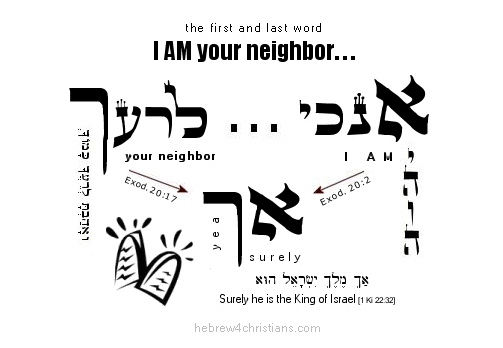 |
Finding the Way of Escape...

04.27.23 (Iyyar 6, 5783) Where it is written, "God is faithful, and he will not let you be tempted beyond your ability, but with the temptation he will also provide the way of escape, that you may be able to endure it" (1 Cor. 10:13), we note that the Greek text says that God will actively "make with the temptation the way of escape" (ποιήσει σὺν τῷ πειρασμῷ καὶ τὴν ἔκβασιν) so that you may be able to bear it.... When I was younger, I tended to think of temptation as the appeal to gratify my flesh, to impulsively seek hedonistic pleasure, and so on, but now I understand "temptation" (πειρασμό) to encompass far more than just that.
For instance, whenever I regard my experience in human or "natural" terms, apart from the consciousness of God's all-pervading and sustaining Presence, then I am surely under temptation. Fear, anger, despair, grumbling self-pity, and so on -- all are temptations to unbelief... This encouraging verse, then, assures us of the Divine Presence in every moment, at every turn of our journey, and in every circumstance. God is always present to help you as you turn to him in faith. The sages state in this regard: "God creates the cure before the plague," meaning that His love is the foundation of all things: עוֹלָם חֶסֶד יִבָּנֶה / olam chesed yibaneh: "steadfast love built the world" (Psalm 89:2). Just as God created mankind only after He created the pathway of repentance (i.e., the "Lamb slain from the foundation of the world": Eph. 1:4, Heb. 4:4, Rev 13:8), so the escape from temptation was likewise foreseen and provided. In all things, then, may we humble ourselves and seek God's face, understanding our radical dependence upon Him for our deliverance.
Hebrew Lesson
Psalm 37:23-24 reading (click):
When you become alive to the truth that the LORD is your Rock -- the very ground upon which you live, move, and have your being -- then your steps are made sure. When you are unsure of your way, however, when you walk in uncertainty, you are unsteady in your resolve and are tempted to regard your life as being without any solid foundation or direction.... As you commit your way to the LORD, your steps are made sure, for you are walking before his Presence, and therefore you are upheld by his power...
In all your struggle remember that salvation is found in the power and righteousness of God, and not your own will or resolve (Rom. 1:16). I'm so glad it's not the strength of my grip that keeps me holding on to God, but the strength of his...
Loving the Stranger...
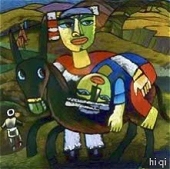
04.27.23 (Iyyar 6, 5783) From our Torah portion this week (Acharei-Kedoshim) we read: "You shall love the stranger as yourself" (Lev. 19:34). But how is this possible apart from empathy for someone who is lost? The unspoken assumption here is that since we know how it feels to be an outsider, oppressed and without a sense of home, so we ought sympathize with others who feel that way too.
When we acknowledge the pain of others we also acknowledge our own. We let go of the weapons of blame and retribution when we give voice to the "stranger" within ourselves, when we realize that others share in our suffering: "Do not oppress a sojourner, for you know the soul of a stranger (וְאַתֶּם יְדַעְתֶּם אֶת־נֶפֶשׁ הַגֵּר), for you were strangers..." (Exod. 23:9). The Hebrew verb used here (i.e., yada, to know), implies intimacy, personal and direct understanding. You "know the soul" of the stranger by reliving their place, and by using the "good eye" to see how they share common our pain, joy, hope, and so on.
Being sensitive to the heartache of others helps us find our own healing: We are brought out of our "inner Egypt" into freedom and wholeness. Remembering what it was like to be a stranger helps us extend compassion to ourselves, and that brings healing to our hearts.
The mitzvah to love the stranger applies not only to someone whom we regard as an "outsider," but more radically to the "stranger within ourselves," that is, to those aspects of ourselves we censor, deny, or reject. Like the prodigal son, we have to "come to ourselves" to return home (Luke 15:17) - believing that we are somehow redeemable - yet we will be unable to know how we are unconditionally loved until we venture complete disclosure. That is the great risk of trusting in God's love for your soul: You must accept that you are accepted despite your own unacceptability... Those parts of ourselves that we "hide" need to be brought to the light, atoned for, healed, and reconciled. If we don't love and accept ourselves, then how can we hope to love and accept others?
Hebrew Lesson
Deut. 10:19 reading (click):
Extraordinary Encounters...

[ The following is related to our Torah reading this week, parashat Acharei Mot-Kedoshim... ]
04.27.23 (Iyyar 6, 5783) We "sanctify" our hearts whenever we consciously focus on what is sacred, awesome, wonderful, and glorious about Reality, and in particular, on the Living God, oseh shamayim va'aretz (עשֵׂה שָׁמַיִם וָאָרֶץ), the Maker of Heaven and Earth, and the great salvation we have in Yeshua. In our Torah portion this week (i.e., Acharei Mot) we read: "You shall not do as they do (לא תַעֲשׂוּ) in the land of Egypt, where you lived, and you shall not do as they do in the land of Canaan, to which I am bringing you. You shall not walk in their statutes" (Lev. 18:3). In other words, we are not to follow the crowd, to appeal to the status quo, or to mimic the customs of the world because we are a visionary people who walk by faith in the Torah of the LORD (Psalm 119:1-3).
Being in a vital relationship with God means separating from the ordinary and mundane, leaving our "original homeland" behind us and crossing over to the realm of blessing. Abraham had to leave the land of his father before he could receive the promise; the Israelites had to trek far into the desert before they received the vision at Sinai, and we have to leave our old lives behind to partake of newness of life. There is a radical break from the past -- we are transformed, reborn, and made into new creations by the miracle of God (2 Cor. 5:17). "Being holy" therefore means coming alive and looking away from that which deadens our hearts (Col. 3:1-4). Behold, the LORD God of Israel makes all things new!
The call to be holy is radical and completely contrary to the world and its messages of conditional approval. Worldly culture flatters itself by making a pretense of true originality and genuine love. It imagines itself to be "cool," unconventional, creative, sophisticated, artistic, and so on, but in truth it is trite, uninspired, and cloyingly tragic. To be truly original means encountering God in your daily experience, struggling through the day in faith, disregarding the clamor and demands of popular culture and its idolatry (i.e., fads, fashions, trends, etc.). God calls his people to come alive, to be new, and to experience abundant life; we are to treasure the unseen, the possible, and to keep faith in the healing good that will overwhelm all darkness. Now that's radical; that's original; that's powerful.
Note the connection between worldliness and idolatry, since idolatry essentially involves trying to find your identity, your worth, your satisfaction, and your ultimate fulfillment in the realm of the transitory and the finite (i.e., the world) rather than in God.... We are (rightly) warned against the vices of "worldliness" and are admonished to abstain from popular culture and its spurious values, but note well that worldliness extends well beyond all this, since it concerns understanding the identity and nature of the person as a whole. The fruit of worldliness is the result of being rooted in this world rather than in God's kingdom. The various desires of the human heart - even the desire for "normal things" like personal happiness in this world - may be regarded as "worldly" if they are devoid of submission to God and His rule. Conversely, even Christian workers may be "worldly" if they base their identity in what they do rather than who they are in the Messiah...
We are "in" but not "of" the world; we are embedded within our culture to be salt and light, and that means we stay true to our vision and relationship with the LORD our God... We don't have to reinvent the wheel, however, since we learn from one another and especially from the testimony of our holy Scriptures, but nevertheless we must personally venture out and encounter God within our own hearts, trusting in his love for our everlasting healing. B'chol dor va'dor: in each generation an individual should look upon himself or herself as having been personally delivered from Egypt. To be efficacious, the message of the Passover Lamb must be personally received by the heart of faith.
Renew the affirmation of faith and know who you are: "If then you have been raised with Messiah, seek the things that are above (τὰ ἄνω ζητεῖτε), where the Messiah is seated at the right hand of God; focus your thoughts on the things above - not on things here on earth - for you have died, and your life has been hidden with Messiah in God. Then when the Messiah, who is your life, appears, you too will appear with him in glory" (Col. 3:1-4). Amen.
Hebrew Lesson:
Leviticus 20:7 reading (click for 2 min audio):
שמירת לשון
Guarding your Speech...
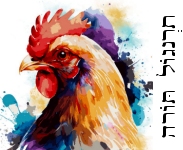
04.26.23 (Iyyar 5, 5783) An old story is told about how Rabbi Moshe Chalfon's grandson once chased a vigorous chicken around a garden. The unruly chicken was quick-witted and the boy was unable to catch it. Panting and red-faced, he began angrily shouting at the bird: "You damned XXX chicken! You just wait and see -- your end is coming!"
Rabbi Chalfon quietly observed his grandson's behavior and then called him over to scold him. "You shouldn't speak in anger and use such bad language!" he began. But the boy did not understand what the fuss was all about. "It's only a dumb chicken," he said, "After all, it can't even understand what I am saying!"
"That does not matter," the rabbi replied. "When you get angry and curse, your words certainly do not come out of your mouth and go somewhere else," he explained. "Instead, your foul language takes your anger deeper into your own heart, giving it a place to abide. Therefore, in order to preserve a pure heart, you must always keep your language clean."
Amen, as it is written in our Scriptures: "Who is the person who desires life, and loves many days, that he may see good? Keep your tongue from evil, And your lips from speaking deceit. Depart from evil and do good; Seek peace and pursue it. The eyes of the LORD are on the righteous, and His ears are open to their cry, but the face of the LORD is against those who do evil, to cut off the remembrance of them from the earth." (Psalm 34:11-16).
Hebrew Lesson
Psalm 34:13 reading (click for audio):
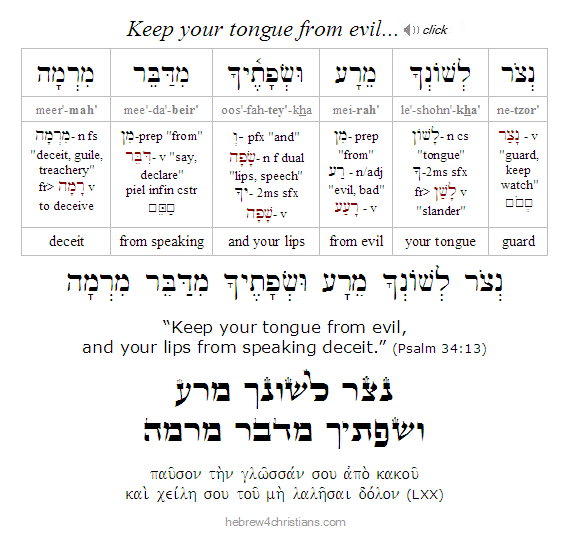 |
Sensing the Sacred...
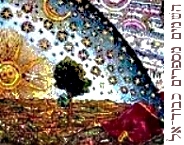
[ The following is related to our Torah reading this week, parashat Acharei Mot-Kedoshim... ]
04.25.23 (Iyyar 4, 5783) The Torah records God's first act of creation with the imperative utterance: "Let there be light" (i.e., yehi or: יְהִי אוֹר), and then goes on to say that "God separated (וַיַּבְדֵּל) the light from the darkness (Gen. 1:3-4). It is this "separation," or distinction, that is foundational to the concept of kedushah (קְדֻשָּׁה), or "holiness." Holiness is also expressed in the distinction between ordinary and sacred time: "God blessed the seventh day and made it holy" (יְקַדֵּשׁ) because on it God rested from all his work that he had done in creation" (Gen. 2:3).
Therefore we are repeatedly told to "distinguish between the holy and the common, and between the unclean and the clean" (Lev. 10:10). Note that the word translated "distinguish" (וּלֲהַבְדִּיל) comes from the same verb used to describe how God separated the light from the darkness. In order to do this, we need understanding (i.e., binah: בִּינָה), or the ability to distinguish between (בֵּין) realms of reality. As it is written in our Torah reading this week: "You shall be holy to me, for I the LORD am holy and I have separated you (וָאַבְדִּל) from other people that you should be mine" (Lev. 20:26).
Hebrew Lesson
Leviticus 20:26 reading (click for audio):
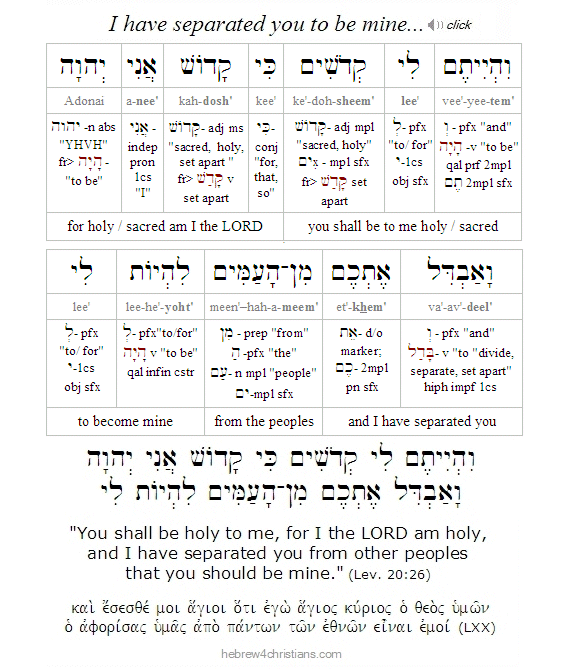 |
"I will lift up my eyes to the hills" (Psalm 121:1). As the Holy One (i.e., ha-kadosh: הַקָּדוֹשׁ), the LORD (יהוה) is utterly unique, distinct, sacred, and set apart as the only One of its kind. He alone is worthy of true worship and adoration, since He alone is utterly peerless, without rival, and stands in relation to the world as Creator, Redeemer, and Lord. To affirm the LORD is holy is to be conscious that He is utterly sacred - and that he calls you to be sacred, too.
Hebrew Lesson
Psalm 112:1-2 reading (click for audio):
Forsake me not, O LORD...
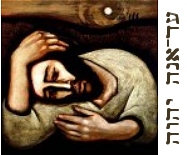
04.25.23 (Iyyar 4, 5783) Though it is true that God will never leave nor forsake us, he nevertheless allows trouble in our lives so that we will learn to call upon him and know his heart in our struggles (1 Pet. 1:5-9; Hos. 6:1-3; Job 5:18; Jer. 3:22). For how else will we understand the truth of our great need for him, and how else his great provision? "Blessed are the poor in spirit," describes the poignant awareness of our inner poverty, our bankruptcy of heart, the destitution of our condition (Matt. 5:3). We cry inwardly, "Forsake me not, O LORD: O my God, be not far from me" (Psalm 38:21) because we realize our need for deliverance from ourselves; we understand that we cannot take even a step in his way apart from his upholding. As Kierkegaard said: "We know that if God should put to the test our faithfulness to him, we know well that at the moment of testing, he himself must hold on to us, that is, we know that at bottom we are unfaithful, and that every instant it is he who at bottom holds us." Amen, as the Spirit intercedes: סְעָדֵנִי וְאִוָּשֵׁעָה - "Hold me up, and I shall be made safe, and I will have respect unto thy statutes continually" (Psalm 119:117).
"Do not forsake me, O LORD," is the mantra in our darkness, the antiphon of God's promised Presence, despite the devouring gloom; it is the cry of the heart that knows that only God can get us through the next moment and its temptation to despair. "Do not forsake me, O LORD, lest I be swallowed up by my pain, my fear, my sadness, my anguish of heart; do not forsake me, for I am nothing but the anguish of the moment, the sorrow of loneliness, the fear of my own heart as I tremble before you in my desperation; O do not forsake me...."
O LORD, You came to heal the sick; you spoke life to those who are without strength or remedy; you came to seek the lost, to find those who are without a place or sense of belonging in this world. O Lord, you know that without you I can do nothing; you know that I am weak, poor, and needy; my path is perilous and I have no hope apart from you. Be not far from me; do not leave me to my own devices nor the counsel of my own soul. Save me, O God, for the glory of your Name; be magnified in your heart of love and faithfulness. Amen.
Hebrew Lesson
Psalm 38:21 reading (click):
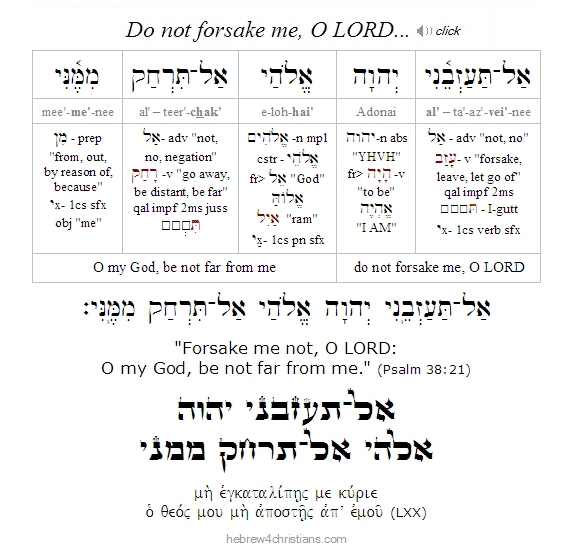 |
A Living Faith...
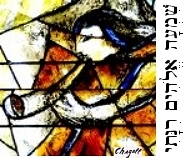
04.25.23 (Iyyar 4, 5783) We read in our Torah this week (Kedoshim): "You shall keep my decrees and my judgments, the pursuit of which man shall live: I am the LORD" (Lev. 18:5). The Kotzker Rebbe advised reading this verse as "You shall keep my decrees and judgments to bring life into them," meaning that we should bring all our heart, soul, and strength into the teaching of Torah. The commandments nourish the soul as food does the body. Just as we seek to season our food to make it flavorful, so we seek to observe the truth with conviction and joy. Amen. "May the beauty of the LORD our God be upon us: and establish the work of our hands upon us; yea, establish the work of our hands" (Psalm 90:17).
ויהי נעם אדני אלהינו עלינו
ומעשׂה ידינו כוננה עלינו
ומעשׂה ידינו כוננהו
vee·hee · noh'·am · Adonai · e·loh·hey'·noo · ah·ley'·noo
oo·ma·a·seh · yah·dey'·noo · koh·ne·nah · ah·ley'·noo
oo·ma·a·seh · yah·dey'·noo · koh·ne·nei'·hoo

"May the beauty of the Lord our God be upon us,
and establish the work of our hands upon us;
yea, establish the work of our hands."
(Psalm 90:17)
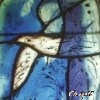
Hebrew Lesson:
Psalm 90:17 reading (click):
God's "Super Sign" of Israel...
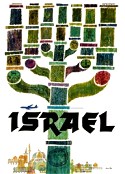
[ Yom Ha'aztmaut is observed on Iyar 5th, which begins Tuesday April 25th at sundown and runs through the following day until sundown... ]
04.24.23 (Iyyar 3, 5783) After the Jewish people had suffered for nearly 2,000 years of exile as foretold by Spirit of God to Moses (see Lev. 26:38, 44; Deut. 28:64-64) and the other Hebrew prophets (Isa. 43:5-6; Jer. 30:11; Joel 3:2; Ezek. 36:8-10; Hos. 9:1-10, etc.), Israel was miraculously reborn as a nation in their ancient homeland on May 14, 1948 (Iyyar 5, 5708). Today Jews across the world celebrate Iyyar 5 as Israeli Independence Day (this year we observe it earlier to so it will not fall on the Sabbath).
Israel's Independence Day is called Yom Ha'atzma'ut (יום העצמאות), the "day of independence." In Hebrew, the word independence (atzma'ut) comes from atzmi - "my bones" (i.e., etzem: עֶצֶם), so the name itself alludes to God's glorious promise to revive the "dry bones" (עֲצָמוֹת) of Israel by bringing the Jewish people back from their long exile during the End of Days (Ezek. 37:1-6). "Son of man, can these bones live?"
Hebrew Lesson
Ezekiel 37:3a Hebrew reading (click):
But why should Christians care about ethnic Israel? After all, many Christian denominations advocate some version of "Replacement Theology" and regard the promises God made to the Jewish people as belonging exclusively to their church... The existence of the modern State of Israel therefore evokes little thanks to God from these groups, and some of their ranks even regard Israel's revived presence on the world stage as an embarrassment to their typically "liberal" theology. Hence we see the (remarkably bad) phenomena of so-called "Christian" church denominations that express anti-Israel sentiment, even asking their followers to divest investments in Israel on behalf of the "Palestinians," etc.
The title "Christ" refers to the anointed King of Israel, the Mashiach (מָשִׁיחַ)... To say "Jesus Christ" is therefore to affirm that Yeshua is none other than the Messiah, the rightful King of Israel (מֶלֶךְ יִשְׂרָאֵל). Followers of Jesus, the One born "King of the Jews" (Matt. 2:2), should therefore care deeply about Israel because the existence of Jewish people - and of the nation of Israel in particular - demonstrates that the LORD (יהוה) is completely faithful to the covenant promises He made to our patriarchs (e.g., Gen. 15:9-21). Indeed, the Scriptures teach that the Name of God is forever designated as אלהי אברהם אלהי יצחק ואלהי יעקב - "the God of Abraham, the God of Isaac, and the God of Jacob" (Exod. 3:15), just as it is also the "LORD God of Israel" (יְהוָה אֱלהֵי יִשְׂרָאֵל). The perpetuity of the Jewish people - despite so much satanic hatred over the millennia - is an awesome testimony of God's loyal love (Jer. 31:35-37). עַם יִשְׂרָאֵל חַי / am Yisrael chai: "The people of Israel live!" Israel is a sign of the "sure mercies of David" (חַסְדֵי דָוִד הַנֶּאֱמָנִים) that are revealed in Yeshua, the Jewish Messiah (Isa. 55:1-6). Moreover, the New Covenant itself, as foretold by the prophet Jeremiah, explicitly promises the perpetuity of the Jewish people throughout the ages:
Behold, the days are coming, declares the LORD (יהוה), when I will make a new covenant (בְּרִית חֲדָשָׁה) with the house of Israel and the house of Judah, not like the covenant that I made with their fathers on the day when I took them by the hand to bring them out of the land of Egypt, my covenant that they broke, though I was their husband, declares the LORD. But this is the covenant that I will make with the house of Israel after those days, declares the LORD: I will put my Torah (תּוֹרָה) within them, and I will write it on their hearts. And I will be their God, and they shall be my people. And no longer shall each one teach his neighbor and each his brother, saying, 'Know the LORD,' for they shall all know me, from the least of them to the greatest, declares the LORD. For I will forgive their iniquity, and I will remember their sin no more."
Thus says the LORD, who gives the sun for light by day and the fixed order of the moon and the stars for light by night, who stirs up the sea so that its waves roar - the LORD of hosts is his Name: "If this fixed order departs from before me, declares the LORD, then shall the offspring of Israel (זֶרַע יִשְׂרָאֵל) cease from being a nation before me forever." Thus says the LORD: "If the heavens above can be measured, and the foundations of the earth below can be explored, then I will cast off all the offspring of Israel for all that they have done, declares the LORD. (Jer. 31:31-37)
According to this theologically critical passage, if you saw the sun shine today or the stars in the night sky, you can be assured that God's promise to preserve the "offspring of Israel" -- (i.e., zera Yisrael: זֶרַע יִשְׂרָאֵל) -- is in effect. Indeed, in the world to come, heavenly Jerusalem will have the names of the twelve tribes of Israel engraved upon its gates (Rev. 21:12). Note well that this is the only occurrence in the entire Tanakh (i.e., "Old Testament") that the New Covenant (בְּרִית חֲדָשָׁה) is explicitly mentioned... It is a foundational passage of Scripture for those who claim to be followers of the Jewish Messiah.
The spiritual blessings Christians enjoy come from the root of God's covenants with Israel... Yeshua our Savior was born the King of the Jews, and he plainly said הַיְשׁוּעָה מֵאֵת הַיְּהוּדִים הִיא- "salvation is from the Jews" (Matt. 2:2; 27:11; John 4:22). The Apostle Paul clearly warned those who think the church has "replaced" Israel: "Remember it is not you who support the root, but the root that supports you" (Rom. 11:18). This doctrine is so foundational that it may be rightly said that how you think about Israel will affect every other area of your theology. Indeed, the nation of Israel is God's "super sign" that He is faithful to His covenant promises (Jer. 31:35-37). Celebrating Israel's existence acknowledges God's loyal love for us all! For more on this subject, see the article, "Is Christianity Anti-Jewish?"
In the holy Torah we read how God said to Moses, "Say this to the people of Israel, 'The LORD, the God of your fathers, the God of Abraham, the God of Isaac, and the God of Jacob (אלהי אברהם אלהי יצחק ואלהי יעקב), has sent me to you.' This is my name forever, and thus I am to be remembered throughout all generations'" (Exod. 3:15).
Hebrew Lesson
Exod. 3:15b Hebrew reading (click):
"Your Name, O LORD, endures forever, your renown, O LORD, throughout all ages" (Psalm 135:13). Therefore the prophet cries: "in the east give glory to the LORD; in the coastlands of the sea, give glory to the Name of the LORD, the God of Israel" (Isa. 24:15).
Hebrew Lesson
Psalm 135:15 Hebrew reading (click):
The Olive Tree Israel...

[ Israeli Independence day begins April 25th at sundown and runs through the following day. ]
04.24.23 (Iyyar 3, 5783) Do you have a Jewish heart? If you say that you love the "LORD God of Israel" (יהוה אֱלהֵי יִשְׂרָאֵל) -- and it's clear that the LORD God of Israel loves the Jewish people -- it follows that you likewise will love the Jewish people (see Deut. 7:6-8; 14:2; 2 Sam. 7:23-24; 1 Kings 8:53; 10:9; 1 Chron 17:20-21; Isa 43:1-3; Jer. 31:31-37; Ezek. 36:24-28; Rom. 11:1-2;11:28; Hos. 11:1-11, etc.). After all, the LORD Yeshua is called מֶלֶךְ הַיְּהוּדִים / melech ha-Yehudim: the "King of the Jews" (Matt. 2:2, 27:11, etc.), and the very term "Mashiach" [i.e., "Christ"] is a regal term denoting the anointed King of Israel. Christians who pray to "Jesus Christ" are really praying to Yeshua as the anointed King of the Jews... And one day (very soon) Yeshua will indeed return to Jerusalem, the "City of the Great King" (Matt 5:35), to assume the throne of David and complete the redemption originally promised to the Jewish people (Zech. 12:1-13:1; 14:1-9, Ezek. 37:12-14, etc.). God will prove faithful to ethnic Israel, friends, and to deny this is to radically question God's faithfulness to the "Church." Indeed, let me say this as plainly as I can: Churches or teachers who claim that God has abandoned ethnic Israel are directly impugning the credibility of the Gospel message itself. Yes, it's that serious of an issue...
Note the verse that says, "I will bless those who bless you, but the one who discounts you will be cursed" (Gen 12:3). Why is this the case, chaverim? The answer is found in the second half of the verse: "For in you all the families of the earth shall be blessed" [i.e., through the advent of your Seed, the Messiah]. We cannot impugn the promises of God given to the Jewish people without likewise impugning God's promises given to us in Messiah. To say that God is "done with the Jewish people," or to consign them to a dark fate, is to disregard them, to curse them, and that results in reciprocal judgment from heaven.
Hebrew Lesson
Genesis 12:3a reading (click):
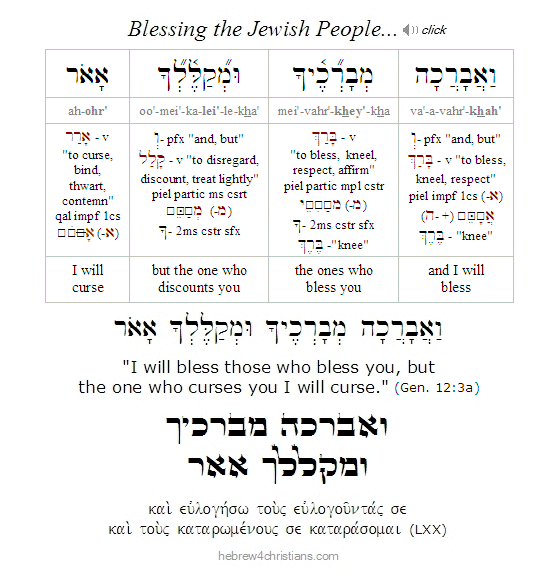 |
The physical descendants of Abraham are called בָּבַת עֵינוֹ (bavat eino), the "pupil of God's eye" (Zech. 2:8), a term of endearment that the LORD uses for no other nation on earth. Indeed the very habitations of the nations were established based on the number of the children of Israel (see Deut. 32:8). The Scriptures declare that the LORD will never abandon His original covenant people but will yet choose them for His Name's sake (Isa. 14:1). The church has not replaced Israel in God's redemptive plan but is merely "grafted in" to the original "root" of Israel. "Remember," Rabbi Paul warns, "it is not you who support the root, but the root supports you" (Rom. 11:18). "Blessed be the LORD God of Israel From everlasting to everlasting! And let all the people say, "Amen!" (Psalm 106:48).
Note: Please don't regard the "curse" mentioned in Gen. 12:3 to suggest that God is somehow vindictive, petty, etc. No, the reason the curse befalls those who reject God's plan for Israel is because Israel was the means God chose to bring salvation to the world: Yeshua was born the King of the Jews who came to ransom all those who trust in him from the curse of spiritual death (Gal. 4:4, Rom. 3:2, John 4:22). The reason God can't bless people who hate the Jewish people or Israel is because that would mean he would bless those who hate the truth, who spurn salvation, and who love darkness... The same God who promises us life and healing in Yeshua is the one who promised never to cast of Israel or to eternally disown the Jewish people. To paraphrase C.S. Lewis, God cannot give us a good apart from himself, since there literally is no such thing.
Hebrew Lesson
Psalm 135:4 reading with commentary (click):
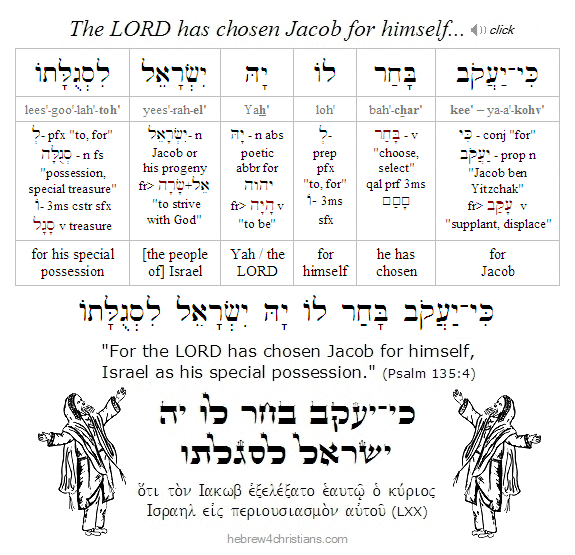 |
Related Topics:
The Heart of Atonement...

04.24.23 (Iyyar 3, 5783) Most of our deepest anxieties come from the fear of death, whether we are conscious of this or not... Death represents fear of the unknown, fear of being abandoned, fear of being rejected, fear of being separated from others, and so on. I am so glad Yeshua gives us eternal life, which for me is not so much about immortality of the soul as it is being loved and accepted by God... That is what "at-one-ment" means, after all (John 17:22-23). Because God loves and accepts us, we trust Him to be present for us, even in the darkest of hours, on the other side of the veil, where he there "prepares a place for us" (John 14:2). As Yeshua said, "I tell you the solemn truth, the one who hears my message and believes the One who sent me has eternal life (חַיֵּי עוֹלָם) and will not be condemned, but has passed (i.e., μετά + βαίνω, lit., "crossed over" [עָבַר]) from death to life" (John 5:24). God's love "crosses over" from death to life and now forever sustains me.
Our Torah reading for this week (Acharei Mot) provides details about Yom Kippur, or the "Day of Atonement," a special service that gave ritual expression of God's love by making purification for our sins. As I've explained before, the word for love (i.e., ahavah: אהבה) equals the number thirteen (1+5+2+5=13), but when shared it is multiplied: 13 x 2 = 26, which is the same value for the Sacred Name (יהוה), i.e., (10+5+6+5=26). Likewise the Hebrew word for "life" is chayim (חַיִּים), is written in the plural to emphasize that life cannot be lived alone but must be shared. Notice that within the word itself are embedded two consecutive Yods (יי), representing unity in plurality (Yod-Yod is an abbreviation for YHVH, also indicating the "deep Akedah" of Father and Son). God gave up His life so that we can be in relationship with Him, that is, so that we can be "at-one" with His heart for us. Whatever else it may mean, then, the Hebrew word for "atonement" (i.e., kapparah, "covering," "protection," "purification," "forgiveness") is about accepting God's heart for you - being unified in his love - and if you miss that, you've missed the point of the Torah's teaching....
Hebrew Lesson
Psalm 118:17 reading (click for audio):
Parashat Acharei-Kedoshim
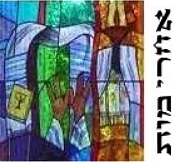
04.23.23 (Iyyar 2, 5783) Shavuah tov ve'chodesh tov, chaverim. This week we have another "double portion" of Torah. Our first Torah portion is called Acharei Mot (אחרי מות), which transitions from the preceding readings regarding ritual purity (tahora) to recall the tragic incident of Nadab and Abihu, the two sons of Aaron who were killed when they offered "strange fire" upon the Altar of Incense during the dedication of the Tabernacle (see Lev. 10:1-2). Because these priests approached the Holy of Holies in an incorrect manner, the LORD further commanded Moses to instruct Aaron that he should enter the innermost chamber only in a carefully prescribed manner once a year - on the tenth day of the seventh month - during the sacred time called Yom Kippur (i.e., the "Day of Atonement").
On this most solemn day, Aaron was commanded to immerse himself in a mikveh (pool of fresh water) and to dress in all-white linen. He then was instructed to slaughter a bull as a personal sin offering. Aaron then brought some ketoret (incense) to burn within the Holy of Holies before returning to sprinkle the blood of the sin offering seven times before the Ark of the Covenant (i.e., the kapporet or "Mercy Seat"). Aaron repeated this procedure using the blood of one of two goats that was selected (by lot) to be slaughtered as a sin offering on behalf of the people. After this, Aaron took more of the sacrificial blood and purified the Altar of Incense and the other furnishings of the Tabernacle. Later, the fat of these sacrifices was burned on the Copper Altar in the courtyard, though the hide and the flesh were to be entirely burned outside the camp.
After purifying the Tabernacle, Aaron went to the gate of the courtyard and laid both hands upon the head of the other goat (designated "for Azazel," a name for the accusing angel) while confessing all of the sins and transgressions of the people. This "scapegoat" was not slaughtered, however, but was driven away into the wilderness, carrying "all their iniquities unto a land not inhabited." Finally, Aaron returned to the Tent, washed and changed his clothes, and offered two more burnt offerings – one for himself and one for the people – to complete the purification process.
This elaborate ritual was ordained to be a decree for Israel, and the day of Yom Kippur was to be observed every year as a time of "affliction and mourning" for all the people. The portion ends with further instructions about making sacrifices, including the prohibition against offering sacrifices apart from the rites of the Tabernacle. The consumption of blood is explicitly forbidden, since blood was reserved for sacrificial purposes upon the altar.
Our second Torah portion, called Kedoshim (קדשׁים), provides a series of social and ethical commandments concerning the practical expression of holiness in daily life: "Speak to all the congregation of the people of Israel and say to them, You shall be holy (קדשׁים תהיו), for I the LORD your God am holy" (Lev. 19:2). Indeed this portion lists more mitzvot (commandments) regarding practical ethics (musar) than any other of the Torah, thereby directly connecting the holiness of the community with obedience to God's moral truth.
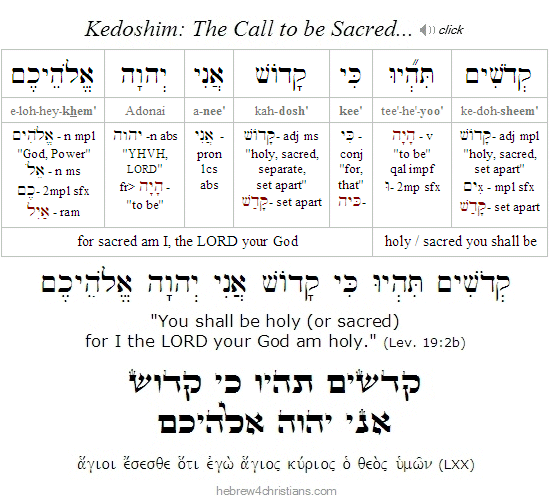 |
After stating the requirement to be holy, the LORD begins to explain, "Each of you must respect (i.e., yirah: יִרְאָה) his mother and his father, and you must keep my Sabbaths. I am the LORD your God" (Lev. 19:3). The duty to revere (or honor) one's parents recalls the Fifth Commandment (Exod. 20:12), which is the starting point of learning to respect other people in our lives. Notice that the word for "my Sabbaths" (שַׁבְּתתַי) implies both the keeping of the weekly Sabbath as well as the "appointed times" of the LORD. As we will see, sanctifying time is a way we can express practical holiness in our lives...
Various practical commandments are given in this Torah portion through which a Jew is sanctified, or set apart to be kadosh - holy - and therefore fit for relationship with God. God is not only "wholly Other" (i.e., transcendent) but also pervades all of creation (i.e., "immanent"), and those who are called into His Presence must therefore be holy themselves. Such practical holiness results in sanctification obtained through the observance of commandments (mitzvot). These commandments include both mitzvot aseh (commandments to do something) and mitzvot lo ta'aseh (commandments to refrain from doing something). In addition, chukkim, or "statutes" are given that further separate the Jew from the customs and profanity of the surrounding nations.
Returning to the Lord...
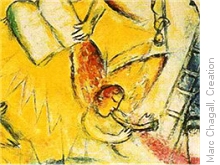
[ I shared this short message just before the secular New Year, but it is worth repeating during this season as well... ]
04.20.23 (Nisan 29, 5783) The Book of Lamentations is an acrostic (i.e., alphabetical) poem that begins with the Hebrew letter Aleph (א) in the word "eichah" (אֵיכָה), which also marks the Hebrew name of the book. "How (eichah) lonely sits the city that once was full of people!" (Lam. 1:1). The sages note that this word "how" (i.e., eichah) could also be read as "where are you?" (i.e., ayeka: אַיֶּכָּה), God's first word spoken to Adam after he broke covenant in the Garden (Gen. 3:9).
Note that God's question is often our own: "Where are you? Where are you, God? Are you here, in the midst of this tedious moment? Do you know my loneliness, my ache for love? Do you understand the troubles of my heart?" And yet how many people have faith that God's call is one of comfort and restoration? God uses our loneliness ("how lonely...") to search our hearts, asking each of us, ayeka – "Where are you?" Return to Me. "Why have you turned away from me and chosen a state of exile?" Our haunting sense of God's absence impels us to seek for him... God awaits our only possible response, "Hashivenu!" -- an imperative (urgent appeal) for the grace to repent: "Turn us back to yourself, O LORD, so that we may return to you; renew our days as of old" (Lam. 5:21).
Hebrew Lesson
Lamentations 5:21 Hebrew reading (click):
Our response to the questioning love of the LORD is called teshuvah ("turning [shuv] to God"). Teshuvah is an "answer" to a shelah (שְׁאֵלָה), or a question. God's love for us is the question, and our teshuvah – our turning of the heart toward Him – is the answer. As Jeremiah confessed in the hour of great trouble: "I called upon thy name, O LORD, from the depths of the pit; Thou hast heard my voice: hide not thine ear at my breathing, at my cry. Thou drewest near in the day that I called upon thee: thou saidst, Fear not" (Lam. 3:55-57).
Keeping your Focus...
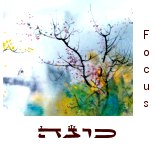
04.20.23 (Nisan 29, 5783) The walk of faith involves "kavanah" (כַּוָנָה), or focus: We must "press on" (διώκω) to hear the upward call of God (Phil. 3:14). The problem for many of us is that we are distracted by various other things; we are rendered indecisive, and therefore we hesitate to draw near to the Lord... A divided heart is at war within itself, "two-souled" (δίψυχος) and unstable in all its ways (James 1:8).
If "purity of heart is to will one thing," then impurity of heart is the result of simultaneously willing two things... It is therefore a state of inner contradiction, of having two separate "minds" or "wills" that hold contrary thoughts or desires. Yeshua said that "a divided house cannot stand." May it please God to heal us of such ambivalence by making our hearts whole, resolute, steadfast, full of conviction, and entirely awake to the glory of His Presence at our right hand (Psalm 16:8).
The LORD is always near; he is not far from each one of us. "Draw near to God (ἐγγίσατε τῷ Θεῷ) and he will draw near to you; purify your hearts, you double-minded" (James 4:8). As it is written: "The LORD is near to all who call on Him, to all who call on Him in truth" (Psalm 145:18). May we be set free from lesser fears that divide the heart and rob the soul of shalom shelemah, God's perfect peace... Amen.
Hebrew Lesson:
Psalm 145:18 reading (click for audio):
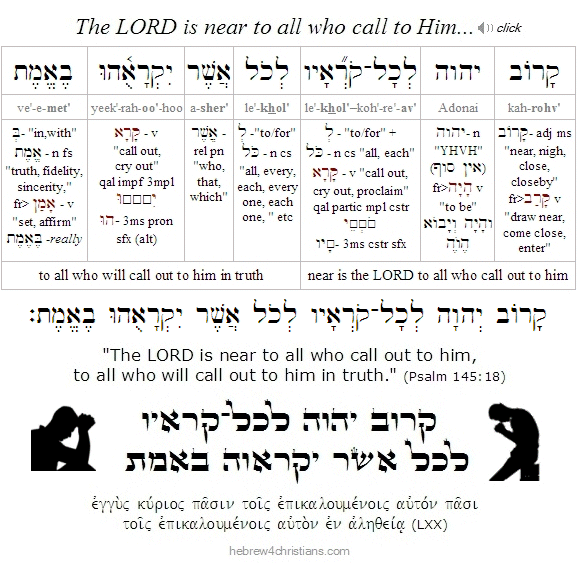 |
Priests and Lepers...
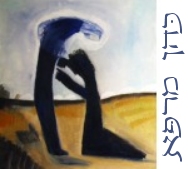
04.20.23 (Nisan 29, 5783) In our Torah portion for this week (Tazria) we read: "When a person (i.e., adam: אָדָם) has on the skin of his body a swelling (שְׂאֵת) or a scab (סַפַּחַת) or a bright spot (בְּהֶרֶת)... he shall be brought to the priest" (Lev. 13:2). Here the sages note three common afflictions that befall the "children of Adam," namely, 1) swelling (i.e., שְׂאֵת), representing arrogance; 2) scabs (סַפַּחַת), representing worldly vanity (from a root (סָפַח) that means to "join together"); and 3) bright spots such as moles or macula (i.e., בַּהֶרֶת), from a root (בָּהָר) meaning to enlighten, representing carnal reasoning to regard the ways of God.
When we see only the affliction, we must go to the priest – to one who helps mediate the Divine Presence – to see how deep the affliction is and what its root might be... Symbolically, since we are all priests to one another (see Exod. 19:6; 1 Pet. 2:5,9; Rev. 1:6), we share our afflictions with one another, allowing ourselves to be seen, and to confess our need for healing. "Therefore, disclose (ἐξομολογέω, lit. 'confess out') your sins to one another and pray (εὔχομαι) for one another, that you may be healed..." (James 5:16).
Followers of Yeshua are intended by God to be healers (Luke 9:1). The most common word for healing in the New Testament is therapeuo (θεραπεύω), a word that means to serve, to care for, and to restore to health. Unlike some ministers who draw crowds to demonstrate the power of miraculous "faith healing," true spiritual healers take the time to listen to others, to hear their inward pain, and to extend compassion and grace to them. They help open the inner eyes of the heart by extending hope and a new vision about what is real... Indeed, lasting healing focuses less on being cured than on finding hope that will never die.
Hebrew Lesson:
Psalm 103:3 reading (click for audio):
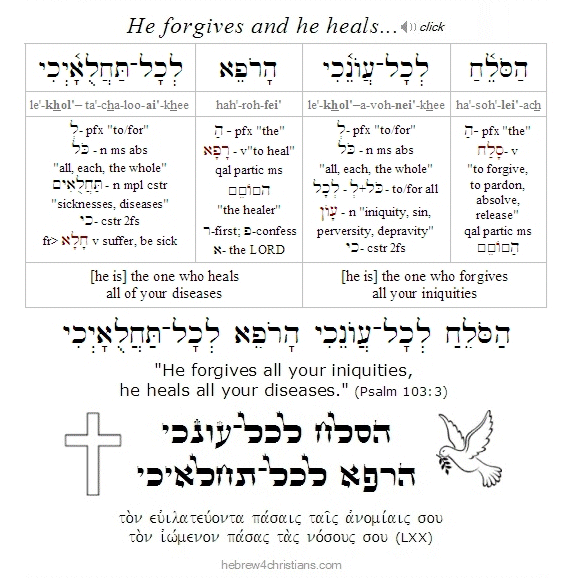 |
Witness of the Spirit...
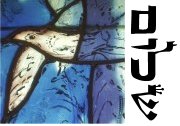
04.20.23 (Nisan 29, 5783) "Because you are his children, God has sent the Spirit of his Son into your hearts, crying, "Abba! Father!" (Gal. 4:6). Note here the Spirit does not cry out using "esoteric" or magical names for God, nor does the Spirit refer to one of God's many titles based on the divine attributes, but instead uses a term of intimacy and profound trust. After all, the word "abba" (אַבָּא) is not so much a name for God as it is a claim about who you are -- it is a confession that you belong to the Lord as his beloved child...
Throughout his ministry Yeshua referred to the LORD simply as his "Father," though he used the intensive address "Abba, Father" (Ἀββᾶ, ὁ πατήρ) just before his arrest and crucifixion, that is, during his intercession at Gethsamane (גַּת שְׁמָנִים), near the olive oil press on the Mount of Olives where the anointing oil for the Temple (שֶׁמֶן הַמִּשְׁחָה) was made, and therefore he called upon "Abba, Father" while in deep suffering and tribulation of heart (Mark 14:36). "Take this cup away from me. Yet not what I will, but what you will..." The mixed dialect of Hebrew and Greek here (i.e., Ἀββᾶ, ὁ πατήρ) may indicate identification with both the Jewish people and the Gentiles who would be united in his passion, as it says, shalom shalom la'rachok vela'karov: "Peace, peace, to him who is far off and to him who is near," says the LORD; oo'refativ: "and I will heal him" (Isa. 57:19, Eph. 2:15).
Knowing God as your heavenly "father" is an intimate matter of the heart, an inner cry or groan coming from the miracle of spiritual rebirth. "The Spirit himself bears witness to our spirit that we are God's children" (Rom. 8:16). Amen, may we know who we are in Him.
Hebrew Lesson
Isa. 12:2 Hebrew reading (click):
Deliverance from Ourselves...

[ "The nearer a man lives to God, the more intensely has he to mourn over his own evil heart." -- Charles H. Spurgeon ]
04.19.23 (Nisan 28, 5783) We all struggle with sin in our lives, and each of us needs deliverance from various attachments and fears that keep us from the "deeper seeing" of faith. The problem is within ourselves, that is, the contradiction of heart we experience in our double-mindedness, our ambivalence, and our unbelief (Jer. 17:9). We may recite the "Shema" every day and say that we love God with all our being, but in the ordinary moments of daily life we are drawn to other concerns, alien affections, other "gods." Indeed, whatever matters most to us, whatever consumes our attention, time, resources, and our interest, is something we "worship," that is, something we esteem as worthy and valuable...
People necessarily value things, and therefore every person alive is a "worshiper" (i.e., a person who finds "worth" in something). This applies equally to a devout atheist or pious skeptic as much as it does a deeply religious person... The question that matters, however, is what is your ultimate concern? What do you really want? Only when we begin to understand what draws and attracts us can we begin to discern what we really need. Therefore we must first acknowledge our false worship, our radical selfishness, and our sundry attachments in order to be set free. We must confess the truth that we are slaves.
Pride blinds us to the truth of our sickness of heart, persuading us to deny our problems, to cover them up, and to try harder and harder to "control" ourselves. This is a spiritual dead-end, a vicious circle, the "law of sin and death." We are set free, however, when we die to ourselves, that is, when we surrender to the love of God and receive the miracle of promised deliverance. Since we are powerless to change ourselves, to reform our lower nature, and to be healed by our own best efforts, we must abandon our "religion" and rely entirely upon the God for the power to heal. This is an ongoing venture: We die daily; we take up the cross daily, we walk with a limp from our inner struggle, and we cling to God alone show us the way and to guide our steps. Beloved, we have been crucified with Messiah and the old nature has lost its power over us; we are alive by the miracle of God's power. "If we live by the Spirit, let us also walk in the Spirit" (Gal. 5:25).
 |
Hebrew Lesson
Zech. 4:6b reading (click):
Always the First Step...
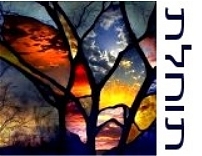
[ "Salvation is free, but discipleship will cost you your life." - Bonhoeffer ]
04.19.23 (Nisan 28, 5783) There is a core element of our spiritual life that is all-determinative, that affects everything else, and that is the decision of whether we will choose to "show up," whether we will engage it's hope; and whether we will open our eyes and yield ourselves to the light... And this is an ongoing decision.
Therefore we read: "If you walk in my statutes (אִם־בְּחֻקּתַי תֵּלֵכוּ) and observe my commandments and do them..." (Lev. 26:3). The sages note that unlike the holy angels, we must "walk out" the faith of our days, and therefore we are always moving either forward or backward. In this world, God's sun shines on the just and unjust alike (Matt. 5:45). Every human being lives by faith of some kind, and it is therefore impossible to opt out of the decision to "choose this day whom we shall serve" (Josh. 24:15). Indifference or apathy is as much a spiritual decision as is outright rebellion, and if we do nothing today to draw us near to the Lord, we will eventually regress and slip backward.
This is all very sobering. "No one knows the day or hour," and that's why it is so vital to turn to God and be healed while there is still time. So turn today and bacharta ba'chayim (בָּחַרְתָּ בַּחַיִּים) - "choose life!" "For this commandment (of turning to God) is not hidden from you, and it is not far away... No, the matter is "very near you" (כִּי־קָרוֹב אֵלֶיךָ הַדָּבָר מְאד) - in your mouth and your heart - to do it" (Deut. 30:11-14; Rom. 10:8-13).
Hebrew Lesson
Deut. 30:19b reading (click):
Purification and Healing...
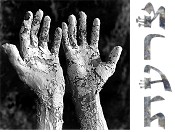
[ The following is related to our Torah reading for this week, parashat Tazria... ]
04.19.23 (Nisan 28, 5783) The cleansing of a metzora (i.e., "leper") corresponded with other significant sacrificial rituals given in the Torah. The sprinkling of the hyssop by the priest recalled the blood of Passover; the offering made of the two birds - one which was sacrificed and the other set free - recalled the scapegoat of the Yom Kippur ritual. The washing of garments, the shaving of all hair, and the immersion in a mikveh (a pool of fresh water) recalled the birth of the Jewish people at the Sea of Reeds. Finally, the blood of the guilt offering sprinkled on the earlobe, thumb and foot, recalled the dedication of Aaron and his sons as the priests of Israel (Lev. 14:14). In other words, the individual purification process mirrored the purification of the community of Israel, and healing ultimately meant being re-identified as a redeemed child of God. In a very literal sense, then, we see how the metzora was "reborn" by water and by the blood (John 3:5; 19:34; Heb. 9:19).
Of the Messiah it is written: "He is despised and rejected of men, a man of pains (אִישׁ מַכְאבוֹת) and acquainted with sickness (וִידוּעַ חלִי), and we hid as it were our faces from him. He was despised and we esteemed him not. Surely he has carried our sicknesses (חֳלָיֵנוּ) and borne our pains (מַכְאבֵינוּ), yet we esteemed him as plagued (נָגַע), smitten of God (מֻכֵּה אֱלהִים) and oppressed. But he was pierced (מְחלָל) for our transgressions (פְּשָׁעֵנוּ), he was crushed for our iniquities (עֲוֹנתֵינוּ): the discipline for our peace was upon him (מוּסַר שְׁלוֹמֵנוּ עָלָיו); and in his blows we are healed. All we like sheep have gone astray; we have turned every one to his own way, but the LORD has attacked in him (הִפְגִּיעַ בּוֹ) the iniquity of us all" (Isa. 53:3-6). Through the substitutionary sacrifice of the righteous Suffering Servant, Yeshua, we are both forgiven and made free from the power of sin and death. Because of Him we are no longer "lepers" or outcasts from the community of God but are made clean through His loving touch.
Notice that the word translated "blow" (i.e., חַבּוּרָה, "wound" or "stripe") comes from the same root as the word "friend" (חָבֵר), and therefore we can read this as "in His friendship we are healed." Yeshua gave up His life for us so that we could become his friends... As He later told us regarding his sacrifice: "Greater love has no one than this, that one lay down his life for his friends" (John 15:13). Indeed of Yeshua it may truly be said, Yesh ohev davek me'ach – "there is a friend who sticks (davek) closer than a brother" (Prov. 18:24).
Hebrew Lesson
Psalm 51:7 reading (click):
Note: For more on this subject, see the article: "Thoughts on Holiness."
Beauty for Ashes...

04.18.23 (Nisan 27, 5783) While there is no official "haggadah" for the Yom HaShoah memorial, it is traditional to light a yellow yahrzeit candle for those who died, to attend a Yom HaShoah memorial service, and to recite kaddish. Some people prepare a lavish meal using recipes written from memory by the starving women of Theresienstadt (salvaged after the war). Many of these recipes are for rich desserts and cakes, recalling days of joy before the women and their families were rounded up and brought to the concentration camps. During the memorial meal, stories of Jews who died are told, as well of those of survivors. Many survivors tell stories about the "hidden children" who were saved by righteous Gentiles (חֲסִידֵי אוּמוֹת הָעוֹלָם). These young survivors were either hidden in secret places (like Anne Frank) or were "adopted" by Christian families who pretended they were their own children.
Though we can't control what happens in this dangerous world, we can trust that God is working all things together for good, even during times of severe testing, and even in things that are blatantly evil (Rom. 8:28; Gen. 50:20). And while we instinctively recoil at the prospect of physical death, there are decidedly things worse than death itself, namely, losing hope in life, walking in the darkness of despair, living a joyless existence because of fear. As much as we abhor evil - and we must resist it with all our hearts - even more must we love the good - and cling to God (וּלְדָבְקָה־בוֹ) with all that is within us.
Ultimately, the most important thing to remember regarding death is the truth about God's salvation (יְשׁוּעָה). After all, God assuredly hates death and provides each of us with its eternal remedy: By clothing himself in human flesh, Yeshua embraced mortality itself and willingly bore the penalty for your sins, exchanging his life for yours, thereby destroying the one who had the power of death, namely the devil, and by so doing, set you free from slavery to the dread of death (Heb. 2:14-15). To those who belong to belong to Messiah, death represents a passage to eternal life and the loving presence of God Himself.
Only the miracle of faith can see hope in the face of radical evil... and yet that is the very message of the cross of the Messiah... Our Lord demonstrated that He is the the Killer of death itself; the Slayer of the Serpent; and the ultimate Triumph of God's Light over the realm of despair and everlasting darkness... He is the First and the Last, the Living One who died, and behold is alive forevermore, the true Keyholder of Death and Hell (Rev. 1:18).
For more on this topic see: "Beauty for Ashes: Further thoughts on the Shoah."
Hebrew Lesson:
Psalm 18:28 reading (click):
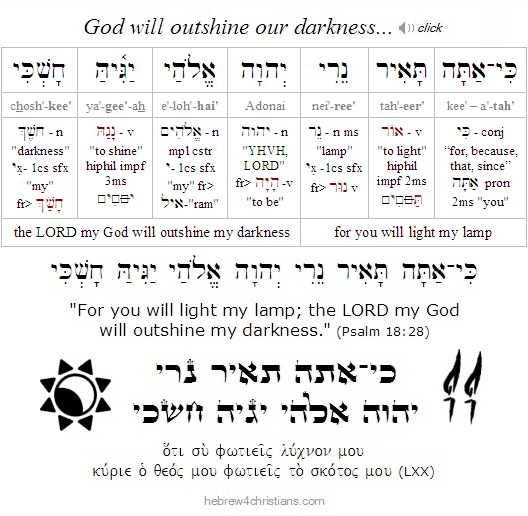 |
Teshuvah of Freedom...
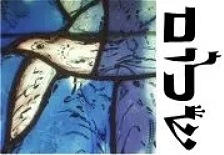
[ "This is the service of men in the world to the very hour of their death: to struggle with the extraneous, and time after time to uplift and fit it into the nature of the Divine Name." - Buber ]
04.18.23 (Nisan 27, 5783) Reading the news of this evil world provides a clear demonstration of Romans 1:28: "Since they did not see fit to acknowledge God, God gave them up to a debased mind to do what ought not to be done." This is the word that describes our godless and brazen generation: "Because they hated knowledge and did not choose the fear of the LORD (יראת יהוה), they refused my counsel and despised my reproof, therefore they shall eat the fruit of their way, and have their fill of their own devices" (Prov. 1:29-1:31). God is patient and loving, of course, though there comes a time when his patience runs out, when -- after repeated warning and appeals -- a culture tragically hardens its heart further and further until God withdraws and people are left to their own vain imaginations and darkened impulses.
A widely accepted maxim of the Talmud is: "All is in the hands of God except the fear of heaven (yirat shamayim)" (Berachot 33b; Niddah 16b). In other words, though God constantly showers the world with grace and light, He does not "force" us to honor His Presence but rather leaves that choice with us. Of course God could overwhelm us all so that we had no choice but to see and fear Him, but He "withdraws" Himself and restrains His influence in our lives so that we can exercise faith. As Blaise Pascal said, "there is enough light for those who want to believe, and enough shadows to blind those who don't." The Hebrew word for seeing (ראה) and the word for fearing (ירא) share the same root. We cannot genuinely "choose life" apart from personally seeing it, but we cannot see it apart from the reverence of God. The reverence of God sanctifies our perception and enables us to see clearly. Therefore the righteous "walk by faith, not by sight" (2 Cor. 5:7).
Hebrew Lesson
Psalm 27:14 Hebrew reading:
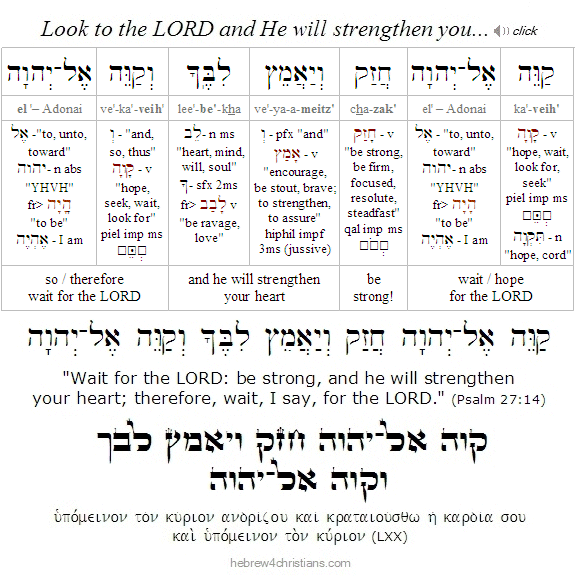 |
Life Worth Living...

04.17.23 (Nisan 26, 5783) It is common to encounter people today who refuse to believe that God exists, not because there are compelling reasons to do so, but simply because they do not want God to exist, and therefore they willfully suppress the intuitions of logic, the apprehension of value, the awareness of glory in creation, and the sentiments of conscience, since all these experiences point to the realm of moral and spiritual reality. As it is stated in our Scriptures: "For that which may be known of God is manifest in them; for God has revealed it to them. For the invisible attributes of him from the creation of the world are clearly seen, being understood by the things that are made, even his eternal power and divinity; so that they are without excuse" (Rom. 1:19-20). Indeed, atheists and agnostics dogmatically affirm that there is no transcendental "moral law" or Moral Lawgiver before whom all moral agents will give account, again, not because reason indicates that this is so, but on the contrary, merely because they wish to be "free" to do whatever they want and to pursue their own selfish desires. In this regard the atheist merely chooses to close his mind because he does not want to see (for an example of this type of madness, read Nietzsche). As Rabbi Israel ben Eliezer (בש"ט) once said, "The world is full of wonders and miracles but man takes his little hand and covers his eyes and sees nothing." Indeed the deification of the self makes the soul a stranger to God and blind to moral and spiritual reality. The modern man will split hairs and fastidiously object to questions of truth and meaning -- all for the sake of living life as he pleases, on his own terms, without recognizing any moral authority beyond himself....
Everyone has a faith system by which they interpret and make sense of what they believe (or trust) is real... Socrates famously said that "the unexamined life is not worth living," which of course implies that a life worth living is discovered by asking questions, searching for meaning, pursuing truth, celebrating wonder, and living with integrity. "Seek the LORD while He may be found" (Isa. 55:6). Contrary to the ideals of worldly culture, the meaning of life is not found in the pursuit of personal happiness (or pleasure) but rather in the pursuit of truth and meaning. Apathy about such matters is a symptom of lifelessness: it is to be spiritually dead while seemingly "alive." Indifferent people are likened to those who go through the outward motions of life without ever making inner traction with it... The righteous, even in death, are called "living"; the wicked, even while alive, are called "dead" (Berachot 18a).
"Truth is so obscure in these times, and falsehood so established, that, unless
we love the truth, we cannot know it." - Blaise Pascal
A radical "metaphysical" question is "Why is there something rather than nothing at all?" Such a fundamental question strikes at the heart of our assumptions and habitual ways of thinking, jolting us from our sleepy "cave-like" consciousness to face the glaring light of the sun... The natural instinct is to turn away, to pull the covers over our head, and try to go back to sleep. However if pressed, the simple question "why" irresistibly leads to a series or "concatenation" of explanations and a regress of ostensible causes that quickly points to metaphysical properties and realities. For instance, if a child asks her parent, "Why do people die?" the parent might answer, "Because people get sick or injured or they might grow very old." "But why do people have to grow old?" the child continues. "Because they are born, live for awhile, and eventually pass away... All things change, and that means they come into being, exist for a while, and then pass away. Look around you; everything you see – the people, the animals, the plants, rocks, mountains and seas, the earth and sky, the stars and galaxies, and indeed the whole universe – is constantly changing, coming into being, existing for awhile, and then passing away..." "But why does everything have to pass away?" the child persists... In this imaginary dialog we see how quickly "why questions" begin pointing to deep metaphysical mysteries such as the nature of being, the phenomenon of time, the ubiquity of change and its existential relationship to human consciousness. The dialectic of asking and answering questions helps us detect the assumptions that underlie our everyday thinking, often revealing wonders that pervade our lives. The failure to seriously ask the "big questions" of life, for instance, "What am I?" "Where did I come from?" "Why am I here?" "Where am I going?" and "What does it all mean?" is to abandon what makes life itself worth living... It is to give up the quest to find meaning, purpose, hope, and a sense of destiny. It is to die inside.
Everyone has a faith system by which they exercise trust is in what is real... The existential question, then, is not whether someone has faith, but what they are trusting about the ultimate concerns, questions of life and death, and so on...
Hebrew Lesson
Isaiah 6:3 reading (click):
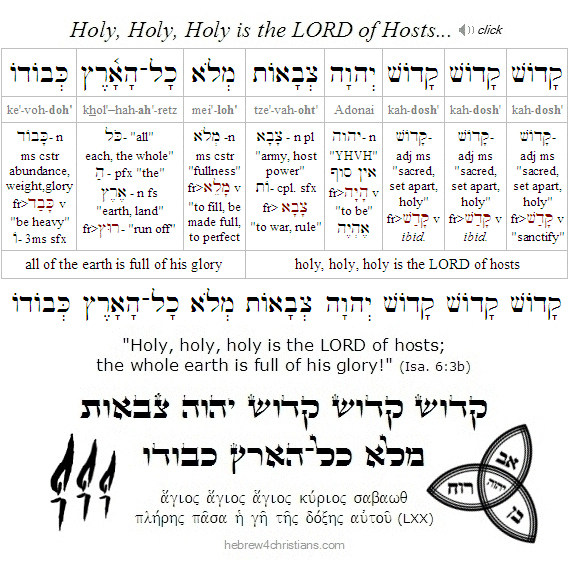 |
The Source of Light...
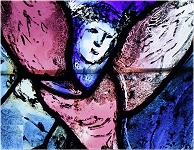
04.17.23 (Nisan 26, 5783) It is written in our Scriptures: "God is light and in him is no darkness at all" (1 John 1:5). Our Savior is "the Light of the world," the overarching Reality that gives light to every soul who is born (John 1:9). As the Source of all light, his power is irrepressible, invincible, and overcomes every shade of darkness. Yeshua is the Logos (Λόγος), the underlying "logic" of all of creation. Unlike the transient radiance of the heavenly bodies, the Divine Light remains constant and supreme over all of creation, without any diminution or variation: God is the "Father of Lights" (James 1:17). And just as we know that the sun still shines even on the most overcast of days, so we understand that the Divine Presence is always there -- always giving, always shining, always loving us... We can trust in the power of our God to help us, since His radiance and truth pervade the darkness to enlighten our way (Psalm 112:4). As Yeshua said of his mission, "I have come into the world as light, so that whoever believes in me may not remain in darkness" (John 12:46). O precious LORD our God, let your light shine upon us...
God's blessing flows, but we must open the eye of faith for the light of God's love to shine within us brightly. As Yeshua our Savior said, "Whoever has my commandments and keeps them, such is the one who loves me. And the one who loves me will be loved by my Father, and I will love him and will manifest myself to him" (John 14:21). Note that the Greek word for "manifest" means to "shine inside" (i.e., ἐμφανίζω, from ἐν, "in" and φαίνω, "shine"), indicating that the revelation would be the inward light of the Divine Presence. Indeed, the Hebrew word for "praise" (i.e., tehillah: תְּהִלָּה) comes from a verb that means "to shine" (i.e., halal: הָלַל), from which the word "halo" is derived. Similarly, the word "aura" comes from the Hebrew word "ohr" (אוֹר), meaning "light." Let your inner light shine before others so that they may see your good works and give honor to your Father who is in heaven" (Matt. 5:16).
Hebrew Lesson
Psalm 36:9 reading (click for audio):
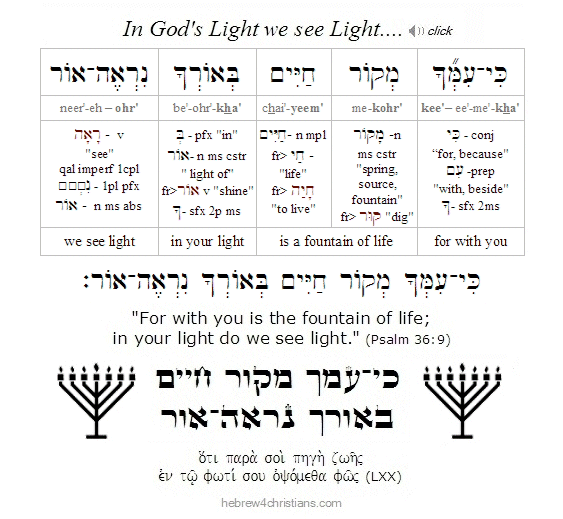 |
Watching your Tongue...

[ The following is related to our Torah reading this week, parashat Tazria.... ]
04.17.23 (Nisan 26, 5783) According to the sages, tzara'at ("leprosy") was a punishment for evil speech, or "lashon hara" (לָשׁוֹן הָרָה). In midrashic literature, lashon hara is regarded as equal to idol worship, sexual immorality, and murder, and the one who indulges in it defiles his mouth so that even words of Torah and prayer are corrupted. "From the same mouth come blessing and cursing; brothers, these things ought not to be so" (James 3:10).
The sages even go further: "Lashon Hara is worse than murder. One who murders, murders but one; however, one who speaks lashon hara kills three: the one who speaks it, the one who hears it, and the one of whom it is spoken." Lashon hara is likened to "emotional homicide" caused by publicly shaming another. According to the Talmud, the shamed person's face is drained of blood and turns white, and therefore humiliation is called "whitening the face" (i.e., halbanat panim: הלבנת הפנים). Therefore the sages identify the metzora (i.e., leper) with hamotzi ra, "one who brings forth evil," and they stress shemirat ha-lashon, the "guarding of the tongue," as a cardinal virtue of the righteous.
"Suffering is a sign that you're out of touch with the truth. Suffering is given to you that you might open your eyes to the truth, that you might understand that there's falsehood somewhere, just as physical pain is given to you so you will understand that there is disease or illness somewhere. Suffering points out that there is falsehood somewhere. Suffering occurs when you clash with reality. When your illusions clash with reality when your falsehoods clash with the truth, then you have suffering. Otherwise there is no suffering." - De Mello: Awareness, 1992
Those who think it easy to control the tongue have likely never really tried to do so. "The tongue is a small member, yet it boasts of great things. How great a forest is set ablaze by such a small fire! And the tongue is a fire, a world of unrighteousness. The tongue is set among our members, staining the whole body, setting on fire the entire course of life, and set on fire by hell" (James 3:5-6). Ultimately, controlling your tongue (i.e., shemirat ha'lashon: שְׁמִירַת הַלָּשׁוֹן) is a matter of controlling your inner thoughts, your heart, and your attitude (shemirat ha-lev). Therefore we are admonished to be "quick to hear, slow to speak, slow to anger," since the anger of man never works the righteousness of God (James 1:19). May the LORD our God help us always to speak with grace, "seasoned with salt" (Col. 4:6); and may we all "speak the truth in love to grow up in every way" (Eph. 4:15).
Hebrew Lesson
Prov. 18:21 reading with comments (click):
Affliction and Teshuvah...
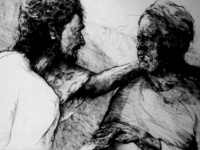
[ The following is related to our Torah reading this week, parashat Tazria... ]
04.17.23 (Nisan 26, 5783) In one of his comments on tzara'at (often mistranslated as "leprosy"), the French medieval commentator Shlomo Yitzhaki, or "Rashi," says that affliction comes from haughtiness, and to be healed requires teshuvah (repentance). However, there is no genuine teshuvah until a person truly understands the greatness of God. After all, a person can be humbled from a broken heart, from serious illness, from poverty, and so on, but were these conditions different there may be a return to haughtiness, as we see in the case of Pharaoh. True humility is unconditioned and is based on the recognition and acceptance of the magnificence and glory of God. Yes, there is godly sorrow that leads to repentance, but ultimately repentance resolves upon the goodness and greatness of God, and without keeping that greater end in view, there is little practical difference between repentance and regret, despair, and shame. May the awe of the LORD be upon us...
Hebrew Lesson
Psalm 67:1 reading (click):
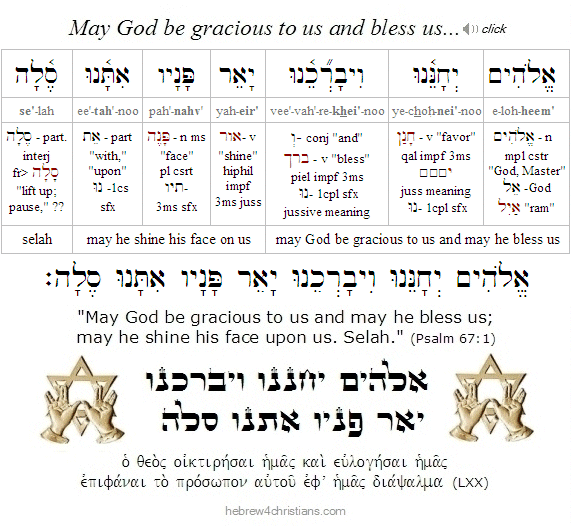 |
Parashat Tazria-Metzora...
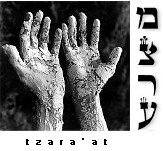
04.17.23 (Nisan 26, 5783) Shavuah tov, chaverim. This week we have a "double portion" of Torah to study, namely parashat Tazria (תזריע) and parashat Metzora (מצרע), both of which focus on the concept of being "clean" (i.e., tahor: טָהוֹר) and obtaining purification from a state of "uncleanness" (i.e, tamei: טָמֵא). The first portion, Tazria, continues the discussion of the laws of "purity" and "impurity" that began earlier with parashat Tzav. Of particular interest are certain afflictions, collectively called tzara'at (צארעת), that caused the affected person (or a thing) to be both ritually impure (tamei) and in a state of uncleanness (i.e., tumah: טומאה). Tzara'at was an a spiritual affliction (i.e., yisur: יסור) that could only be diagnosed by a kohen (priest) and not by a doctor... If someone was diagnosed with tzara'at, they were called a "metzora" (מצרע) and forced to live in a state of exile where they were instructed to do teshuvah (repentance) and seek spiritual healing.
After the metzora had apparently been healed, he or she would call for the priest to be reexamined. If the priest saw no sign of uncleanness, a second examination was scheduled seven days later, and if the person was still free from any sign of the disease, a process of purification (i.e., tahara: טָהֳרָה) would begin. The purification ceremony was somewhat like a "personal Yom Kippur" service. After the second examination, the priest required that the metzora bring the following items for his cleansing:
- An earthenware bowl filled with spring water (mayim chayim)
- Two birds of the same type (whether turtledoves or pigeons)
- A stick of cedar wood
- A hyssop branch
- A scarlet thread
The priest then commanded that one of the birds should be slaughtered over the earthen vessel filled with fresh water, with its blood mixing with the water. The living bird, the piece of cedar, and the hyssop branch were then tied together using the scarlet thread, and the entire bundle was dipped into the earthen vessel. The blood and water mixture was then sprinkled seven times on the healed metzora, and the living bird was then set free.
Once completed, the healed person washed their clothes, shaved off all their hair (including the eyebrows), and was immersed in a mikveh (ritual pool for cleansing). On the eighth day the person would bathe again and offer sacrifices, the blood of which was mixed with oil and applied to the earlobe, thumb and foot -- similar to the blood applied to the priests during their ordination. Only after all this was the person pronounced tahor (clean) by the priest. The time of uncleanness would be over, and he would be like a person brought back from the dead to new life. In a very literal sense, then, we see how the metzora was "reborn" by water and by the blood (John 3:5; 19:34; Heb. 9:19).
Notice how the purification ritual corresponded with other rituals revealed in the Torah. The sprinkling of the hyssop by the priest recalled both the blood of the Passover lamb and the sprinkling of the ashes of the Red Heifer that cleanse from contact with death; the offering made of the two birds - one which was sacrificed and the other set free - recalled the scapegoat of the Yom Kippur ritual. The washing of garments, the shaving of all hair, and the immersion in a mikveh recalled the birth of the Jewish people at the Sea of Reeds. The blood of the guilt offering applied to the earlobe, thumb and foot, recalled the dedication of Aaron and his sons as the priests of Israel (Lev. 14:14). In other words, the individual purification process mirrored the purification of the community of Israel, and healing ultimately meant being re-identified as a redeemed child of God.
Not the Author of Chaos...

04.16.23 (Nisan 25, 5783) These are lawless days, where worldly culture celebrates moral anarchy and teaches the narcissistic philosophy that everyone "should" do what is right in his or her own eyes... These are like the "days of Noah," where the wickedness has become great in the earth, and intention of the thoughts of people's hearts has become evil continually (Gen. 6:5). Because worldly culture has suppressed and exiled the truth of God from the public domain, God has pronounced "like-for-like" judgment by giving people over to the tyranny of their darkened passions, resulting in inner chaos and self-destructive impulses. This is the very worst possible judgment of God - when He removes his hand and says, "Have it your way..." (Rom. 1:28). We now live in a stupefied age wherein people are unable to think clearly or use logic, but instead resort to violence and ad hominem attacks on others because of their derranged thinking and hardened hearts...
The importance of the Torah, or the "law" of God, cannot be overstated, friends. Yeshua plainly said to his followers: "Do not think that I have come to abolish the Law or the Prophets; I have not come to abolish them but to fulfill them. I tell you the truth, until heaven and earth pass away not the smallest letter or even a stroke of a letter (קוצו שׁל יוד) will pass from the law until everything comes to pass. So anyone who breaks one of the least of these commands and teaches others to do so will be called least in the kingdom of heaven, but whoever obeys them and teaches others to do so will be called great in the kingdom of heaven" (Matt. 5:17-19). He further solemnly warned: "Not everyone who says to me, 'Lord, Lord,' will enter into the kingdom of heaven– only the one who does the will of my Father in heaven. On that day, many will say to me, 'Lord, Lord, didn't we prophesy in your name, and in your name cast out demons and do many powerful deeds?' Then I will declare to them, 'I never knew you. Go away from me, you workers of lawlessness' (Matt. 7:21-23).
To the ungodly, "freedom" means being lawless, that is, acting under their own authority apart from the will of God. Their "law" is one of unbridled selfishness: "Do what thou wilt." This of course was the original temptation in Eden, when the nachash (serpent) told Eve that if she acted under her own authority, her eyes would be "opened" and she would be "like God," knowing both good and evil (Gen. 3:5). That is always the creed of the wicked: "Do as thou wilt..." True freedom, however, is not the supposed right to do whatever you want, but instead is the power to do what is right, living in harmony with moral reality, and being liberated from the slavery of impulses to do evil. The moral law of God, then, is the blessing of having boundaries, order, and moral sanity within our lives, and that is why the Holy Spirit inscribes the law "within" us - to help guide our steps, protect our way, and to empower us to live in obedience to the truth of God (Jer. 31:33). If you are led by the Spirit, you are no longer enslaved to the law of sin and death -- that is, the lower nature and its idolatrous impulses -- but you will bear the fruit of righteousness, goodness and truth (Gal. 5:18; Eph. 5:9). Let no one deceive you with vain words. "By this it is evident who are the children of God, and who are the children of the devil: whoever does not practice righteousness is not of God, nor is the one who does not love his brother" (1 John 3:10).
Hebrew Lesson:
Psalm 119:97 reading (click for audio):
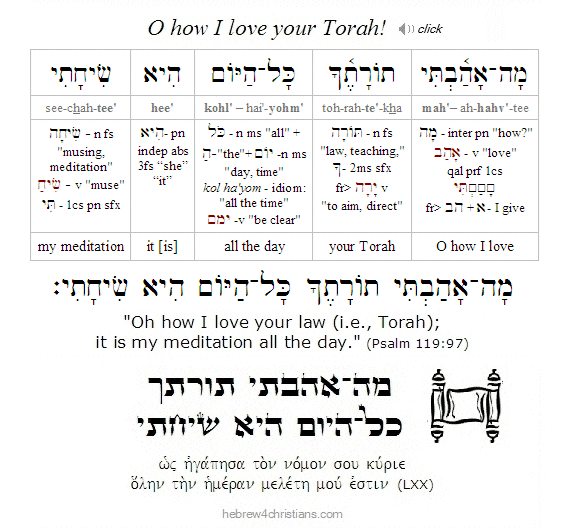 |
Monday April 17th at sundown
Holocaust Remembrance Day...
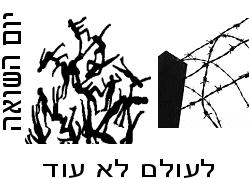
04.15.23 (Nisan 24, 5783) Yom HaShoah, or "Holocaust Remembrance Day," marks Israel's time of commemoration for the approximately six million Jews -- including over a million children -- who perished as a result of the actions carried out by Nazi Germany and its accomplices. It was inaugurated in 1953 and is annually observed on (or about) the 27th day of the month of Nisan, just a few days after Passover Week in the spring. In stark contrast to the celebration of freedom commemorated during Passover, Yom HaShoah marks a very difficult time when we revisit specters of absolute evil and again ask haunting questions about the power and presence of malevolence in our world. Often we are left speechless over the cruelty and depravity of human beings. It all seems so inexplicable, so needlessly horrible, so senseless, so vile... We may feel powerless, despondent, or full of indignation, but still we ask ourselves, how could this have happened? How was all of this possible?
Simply put, the Holocaust was the result of cowardice and self-deception... The systematic, institutionalized, and "politically correct" genocide of the Jewish people was made possible solely because so many others - including nominal "Christians" - forfeited their God-given responsibility to live as authentic individuals by passively surrendering their will to "the crowd." But giving up your identity to join a gang inevitably leads to fragmentation of the soul, potentially inviting in a "legion of demons..." Regardless of whether it's a gang of thugs running an inner city neighborhood, or the pressure to keep quiet over ethical misconduct at your place of work, or the desire to feel "approved" as a good citizen of the state, or even the pressure to conform to a particular religious group, in either case, "losing yourself" in the midst of the crowd is an evasion, a cop-out, and a desecration of the image of God within you. Indeed following the crowd is a form of slavery where you surrender your freedom for the sake of a supposed sense of security... You become self-deceived because you no longer "own" yourself but became the ward of "another." Becoming a member of a crowd makes you into a copy or similitude, a shadow rather than a person of substance.
We must never forget what happened to the Jewish people under Hitler. The Holocaust was made possible because people timidly refused to stand apart from the group to serve as bold witnesses of the truth. And the great risk of our age is the revival of political fascism that attempts to again control, disarm, and violate people's freedom all for the supposed "greater good" of the "state." We must remember that silence in the face of evil is itself evil: "First they came for the communists, and I didn't speak out because I wasn't a communist. Then they came for the trade unionists, and I didn't speak out because I wasn't a trade unionist. Then they came for the Jews, and I didn't speak out because I wasn't a Jew. Then they came for me, and there was no one left to speak out for me" (Martin Niemöller).
This year Yom HaShoah, or "Holocaust Remembrance Day, begins Monday, April 17th (at sundown) and runs through Tuesday April 18th until sundown.
Hebrew Lesson
Zephaniah 1:15b reading (click):
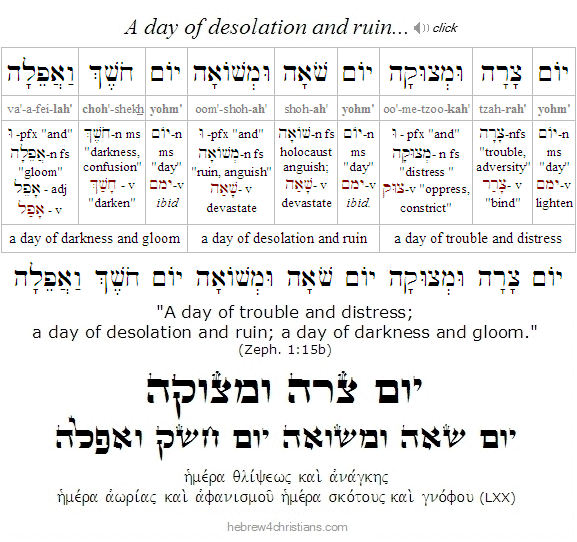 |
I realize that Yom HaShoah (i.e., Holocaust Remembrance Day) is observed this week, but I would be remiss not to mention an earlier genocide of Christians -- mostly Armenians but also Assyrians and Greeks -- that took place under the Islamic Ottoman Empire, throughout World War I, where the Turks systematically massacred approximately 1.5 million Armenians, 300,000 Assyrians, and 750,000 Greeks. Today April 24th is recognized (by some) as "Armenian Genocide Remembrance Day." In Yerevan, the capital of Armenia, hundreds of thousands of people walk to the Tsitsernakaberd Genocide Memorial to lay flowers at the eternal flame. For more information see the links listed below.
Yom HaShoah Podcast...
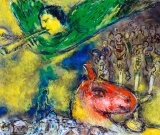
[ Yom HaShoah, or Holocaust Memorial Day, begins Monday, April 17th at sundown and runs through Tuesday, April 18th until sundown... ]
04.15.23 (Nisan 24, 5783) Shalom chaverim. I made an audio podcast for Yom HaShoah, or Holocaust Remembrance Day (see the link below). In it I discuss some of the philosophical influences that led to the atrocities of the attempted genocide of the Jewish people, including the rise of the wild-eyed idealism of G.W. Hegel and the invidious concept of the "dialectic" that was used to negate the value of the individual in preference to the collective.... Hegel directly influenced Karl Marx and his godless materialism and social revolutionary theories, and in general it may be said that German idealism led both to the nihilism of Friedrich Nietzsche and eventually to the barbarity of Adolf Hitler's national socialism. Though the subject matter is a bit philosophical, I nevertheless hope you will find it helpful.
Trust in Dark Hours...

04.14.23 (Nisan 23, 5783) The Spirit of God encourages the downcast: "Let him who walks in darkness and has no light trust in the Name of the LORD (יִבְטַח בְּשֵׁם יְהוָה) and lean upon on his God" (Isa. 50:10). Spiritual darkness is permitted by God for his own sovereign purposes, perhaps as a means to teach us to abandon ourselves to his care. Trusting in God (i.e., bittachon - בִּטָּחוֹן) does not mean that we are obligated to affirm that this is "the best of all possible worlds," though it does mean we believe that eventually God will wipe away every tear and make all things right.
Bittachon is a word for this world, which says, "Though he slay me, I will trust in him..." We do not need to trust for what is seen in this world but for an unseen good (Rom. 8:24). Those who call upon the LORD can trust not only in concealed good behind ambiguous appearances ("all things work together for good") but also in a future, real, substantive good that will one day be clearly manifest for us all... We fight the "good fight" of faith, which is a worthy struggle that eventually is realized for blessing. Meanwhile, we pray to God to be kept from such depth of sorrow that leads to sickness, darkness and despair.
Hebrew Lesson
Isaiah 50:10 reading (click for audio):
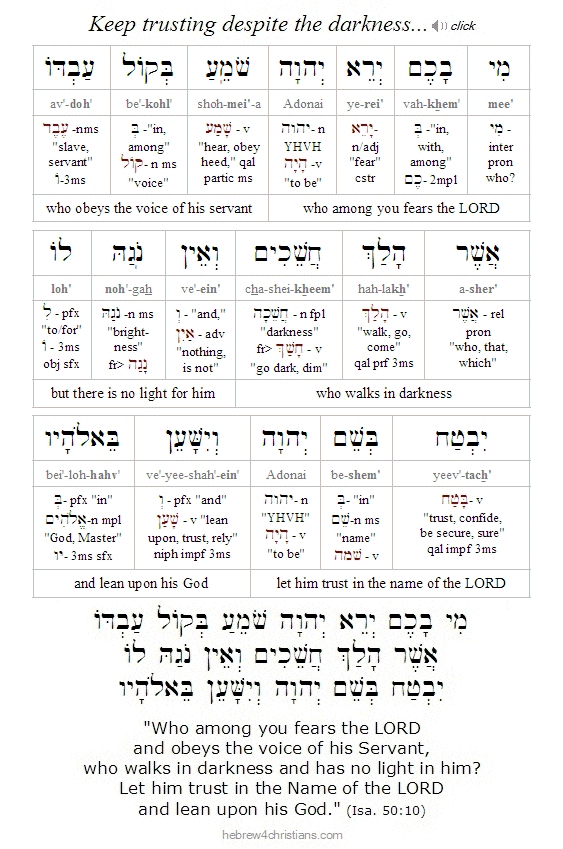 |
If you ask for bread, your heavenly Father will not give you a stone... Only God can deliver us from our "disordered loves" to take hold of what is truly essential. All we can do is ask, and keep on asking - even as we struggle on, despite ourselves, despite our losses... And we often revisit our sins over and over until we become "sick of our sickness," that is, until we begin to understand what our heart really needs. It's as if we are constantly being asked, "Is this what you want?" and our choices confess the truth... Only God does the miracle of real change within the human heart - only God can give life from the dead!
Anticipating Shavuot ("Pentecost")
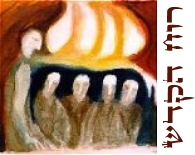
[ The holiday of Shavuot serves as the climax of the Passover Season... ]
04.14.23 (Nisan 23, 5783) A week is called shavu'a (שָׁבוּעַ) in Hebrew, from a root word sheva (שֶׁבַע) that means seven. Seven is the number of holiness and completion, and the first verse of Torah has seven words (בְּרֵאשִׁית בָּרָא אֱלהִים אֵת הַשָּׁמַיִם וְאֵת הָאָרֶץ). In six days God created the heavens and the earth, and on the seventh day he rested and set it apart as sacred (Gen. 2:3). The holiday of Shavuot (שָׁבוּעוֹת), or "weeks," marks the "Jubilee of Passover," which occurs after we count 7x7 (49) days from the day following Passover until we reach Sivan 6 (which this year begins Thursday, May 25th at sundown). Since Shavuot occurs on the 50th day after Passover, the Greek translators of the Torah called it "Pentecost" (πεντηκοστή). Shavuot marks the goal or climax of Passover season, commemorating both the anniversary of the giving of the Torah at Sinai as well as the giving of the Holy Spirit to the followers of Messiah (Acts 1:8; 2:1-4).

The holiday of Shavuot is one of the shelosh regalim (three pilgrimage festivals) given in the Torah (Exod. 23:14-17; Deut. 16:16) and therefore reveals profound spiritual truth for followers of Yeshua (Luke 24:44; 2 Tim. 3:16). God did not want us to miss the significance of this holiday, since it expresses the freedom and truth of the New Covenant of Zion.
Hebrew Lesson
Deuteronomy 16:9-10 reading:
Note: For a bit more to help you "attune" yourself to the holiday of Shavuot, see the articles "Preparing for Shavuot" and "The Law of Liberty."
A Consuming Fire...
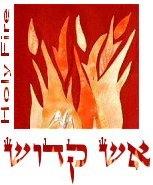
[ The following is related to our Torah reading for this week, parashat Shemini... ]
04.14.23 (Nisan 23, 5783) From our Torah portion for this week (i.e., Shemini) we read: "Now Nadab and Abihu, the sons of Aaron, each took his censer and put fire in it and laid incense on it and offered strange fire (אֵשׁ זָרָה) before the LORD, that He had not commanded them" (Lev. 10:1). The sages interpret "strange fire" (i.e., esh zarah: אֵשׁ זָרָה) as alien passion or illicit zeal stimulated by artificial means (in this case, drinking wine before their service). The experience of intoxication may seem to elevate the soul, but in reality it muddles the ability to discern spiritual realities: "Drink no wine or strong drink ... when you go into the tent of meeting, lest you die. You are to distinguish between the holy and the common, and between the unclean and the clean" (Lev. 10:9-10). Nadab and Abihu were highly honored in Israel, the first priests of God, and if they drank wine before entering the sanctuary it was surely not for crass purposes, but rather to "sanctify" their experience, or so they thought... They were severely judged, however, because they presumptuously sought to sanctify themselves by means of an artificial influence, and this made them "strange" before God. Likewise many people today seek "spiritual highs" and "signs" without undergoing the discipline of Torah study, prayer, meditation, and so on. God wants our hearts in service, but our hearts must soberly reverent before Him (1 Pet. 5:8; Eph. 5:15-18).
"Nadab and Abihu, the sons of Aaron ... brought strange fire ... and they died before the LORD" (Lev. 10:1-2). It is a fearful thing to fall into the hands of the Living God who is called esh okhlah, El kanna (אֵשׁ אכְלָה אֵל קַנָּא) - "a Consuming Fire, a jealous God (Deut. 4:24). Indeed, though atonement was provided under the law for every kind of sin and transgression, there was one exception: "But the soul that sins presumptuously (בְּיָד רָמָה) shall be out off from the midst of my people" (Num. 15:30). We must be careful not to casually regard God's truth with undue familiarity, lest we find ourselves under the influence of strange passions that lead to presumption....
Hebrew Lesson
Deut. 4:24 Hebrew reading (click):
Let us be sober and vigilant, friends. "Now these things happened to them as an example, but they were written down for our instruction, on whom the end of the ages has come" (1 Cor. 10:11). It is prophetically astounding that during the very time that the Tabernacle was inaugurated, tragedy struck and Aaron's two sons were killed. This should warn those teachers who speak casually of God from the pulpit, since they act profanely and encroach upon the Divine Presence. Let us be admonished, friends and honor the Living God. As the sages have wisely said: Da lifne mi attah omed: "Know before Whom you stand!"
Rich toward Heaven...
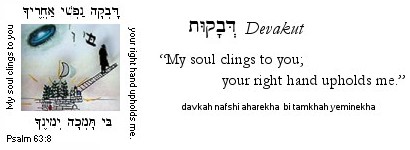
04.13.23 (Nisan 22, 5783) In the Torah we read: "Take for Me an offering…" (Exod. 25:2). The midrash says that this teaches that if you give tzedakah (charity) to those in need, you take God to yourself, as it is written: "For the LORD stands to the right of the needy" (Psalm 109:31), and "Whoever shows pity to the poor lends to the LORD, and his kindness will be repaid to him" (Prov. 19:17).
It may seem counter-intuitive to carnal and worldly reasoning, but when you give to others, you will receive even more in return (Mal. 3:10). Indeed the person who seeks treasure for himself is not rich toward God, since we can only keep what we give away in kindness (Luke 12:21). As our Lord taught: "Give, and it will be given to you. Good measure, pressed down, shaken together, running over, will be put into your lap. For with the measure you use it will be measured back to you" (Luke 6:38).
"Take for me an offering..." (Exod. 25:2). The Torah here indicates that the LORD is our great Kohen Gadol (High Priest), for He asked for terumah (an offering or contribution) just as the earthly kohen was given terumah from the yearly yields of the farmers.
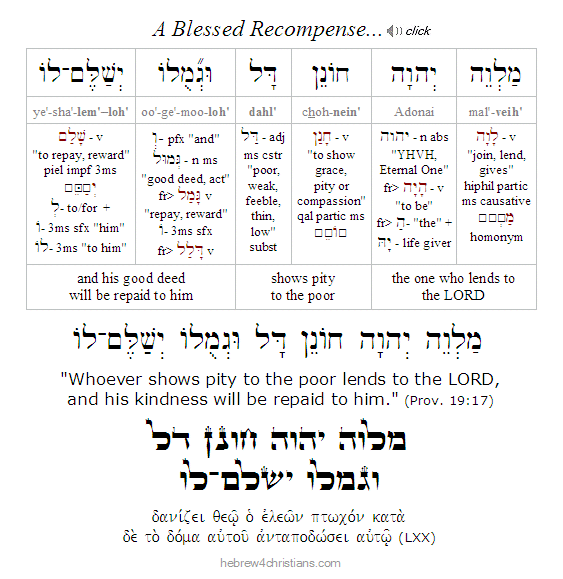 |
Strength for the Weary...

04.13.23 (Nisan 22, 5783) In connection with our Torah portion for this week (i.e., parashat Shemini) the sages ask, "Why does the Torah use a repetitious expression, "Sanctify yourselves and you shall be holy" (הִתְקַדִּשְׁתֶּם וִהְיִיתֶם קְדשִׁים) (Lev. 11:44)? Because when we make an effort - no matter how feeble at times - to draw near to the LORD, He will draw near to us....
There is a story (told in the midrash) that wonderfully illustrates this idea: An old sage once saw a beautifully shaped rock which he very much wanted to bring as a gift to the Holy Temple in Jerusalem. However, the rock was too heavy for him to carry and he couldn't afford to pay porters to bring it to Jerusalem. The man prayed and asked God for help, and soon five angels (disguised as men) appeared to offer the man help. The sage told them that he would like them to carry the stone to Jerusalem, but he couldn't pay them. The five angels immediately offered to carry the rock on his behalf, but only if the man put his finger to the rock to "help" them carry it. The midrash states that although the angels didn't need man's help, the man was required to do what he could.... God then took care of the rest.
In this connection, the Dubner Maggid once told this parable: A tourist once checked into a hotel and asked the porter to bring his suitcase to the top floor, where he had rented a room. After an hour or so the porter knocked on his door and brought in the suitcase, sweating and breathing heavily. "What did you put into your suitcase, stones?", the porter asked, "it is extremely heavy!" The tourist looked at him in surprise: "My suitcase is heavy? Not at all! Mine is very light. You must have mistakenly brought up someone else's suitcase!"
Do you feel "weary" about serving the LORD? Then maybe you have "picked up" some other agenda along the way. The Lord says, "You have not worshiped Me .. that you should be weary of Me... (Isa. 43:22). In other words, serving the LORD leads to freedom and joy. Indeed, the NT Greek word for the word for "joy" (χαρά) is directly related to the word "grace" (χάρις). If you find yourself "weighed down" in your service of God, something may be wrong - and the burden you are carrying might be coming from a source other than God. Where the Spirit of the LORD is, there is liberty... God is not a "slave driver," and indeed the purpose of our redemption was to set us free to serve Him. Yeshua's burden is kal - "light."
People necessarily value things, and therefore every person alive is a "worshipper" (i.e., a person who finds "worth" in something). The question that matters is what is your ultimate concern? What moves you to get out of bed in the morning, to go through your day, to have hope in your heart? What do you really want? Where are you really going? Each of us will stand before God for judgment one day and give account of his or her life... One day all that is hidden will be fully disclosed to the light...
Where it says, "I can do all things through Messiah who strengthens me" (Phil 4:13), that includes being healed of the inner pain of your life: your failures, your shame, the ache of rejection, abandonment, and so on. It means being set free from disillusionment, despair, and the oppression of relentless fear. "I can do all things through Messiah" means no longer accepting messages of self-hatred and hopelessness, no longer heeding the malicious whispers that say: "I am of no value," "I am unlovable," "my life is hopeless." No! "I can do all things through Messiah" means learning to be accepted, honored, and esteemed by God; it means opening your heart to God's love and blessing for your life; it means allowing your heart to be made right, to have inner peace... After all, Yeshua's great prayer was that we would know the truth of God's love for us (John 17), and this is the central need our lives.
Of course sometimes we indeed become weary in life - from sickness, from the world and its oppression, from heartache of life in a fallen world, from the battle with the devil, and so on, though it is vital to remember there is consolation given to us in Messiah, and heavenly food is given to strengthen us (1 Kings 17:4-6). I believe the LORD allows oppression to sometimes chasten us -- that is, to help us remember Him and our profound need for His love to reign within our hearts... As long as that is not settled, there is an ongoing lesson.
"Let us not grow weary of doing good, for in due season we will reap, if we do not give up" (Gal. 6:9). If you find yourself weary, chastened, and broken, then draw near to God, for he has promised to draw near to you: "Sanctify yourselves and you shall be holy."
Hebrew Lesson
Isaiah 40:29 reading (with comments):
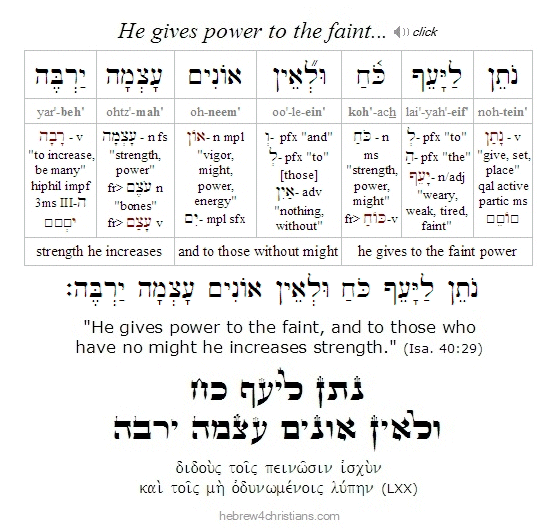 |
The Appointed Times...

[ Happy Passover season, dear friends... ]
04.13.23 (Nisan 22, 5783) The "appointed times" (i.e., mo'edim: מוֹעֲדִים) were given by God to help us turn away from the omnipresent urge within the human heart to embrace vanity: "Every one of you shall revere his mother and his father and guard (שָׁמַר) my Sabbaths (שַׁבְּתתַי)... Do not turn to worthlessness (i.e., אֱלִיל) or make for yourselves any molten gods" (Lev. 19:3-4). In other words, the Biblical holidays such as Passover were intended to help us to sanctify ("set apart," "make holy") the times and seasons in order to remind us of the Divine Presence (Psalm 104:19). Therefore they are called mikra'ei kodesh (מִקְרָאֵי קדֶשׁ), "times in which holiness is proclaimed" (Lev. 23:2). The Torah's declaration that these days are holy implies that they are set apart for special activities, such as commemorating God as our Creator (Shabbat), our Redeemer (Passover), our Resurrection (Firstfruits), our Law Giver (Shavuot), our King (Rosh Hashanah), our High Priest (Yom Kippur), our Shelter (Sukkot), and so on. In this connection it should be noted that it is a mistake to assume that the divine calendar was somehow abrogated with the cross of Yeshua, since all of the Jewish holidays center on Him, and indeed the advent of the promised Ruach Ha-Kodesh (Holy Spirit) occurred precisely after the prescribed 49 day countdown to Shavuot (Acts 1:8; 2:1-4), that is, after Yeshua was raised from the dead...
Presently our lives "suspended" between two worlds - this phenomenal world with its illusions (olam hazeh), and the real world of spiritual substance and meaning (olam haba). We exist in an "already-not-yet" state of expectation and yearning where we must consciously mediate the truth of heaven by bringing it "down to earth." This is a truth war, and by truth I do not mean intellectual knowledge as much as the living truth that marks the lifestyle and vision of a follower of Messiah. We consciously remember Torah truth; we choose to always "set the LORD before us," and take "every thought captive to the passion of Messiah..." May God help us heed the call to walk in holiness by the power of His love and grace. Amen.
Hebrew Lesson
Leviticus 23:3b reading (click):
The Last Word of Truth...

04.12.23 (Nisan 21, 5783) Though people assume they are "free to believe" whatever they want about the meaning and purpose of life, Ultimate Reality will always have the last word... Our Scriptures clearly teach that people ignore God at their own peril, and that we are therefore responsible to believe the truth and to reject what is false (1 John 4:6). This implies that people have a moral and spiritual duty to think clearly and not abuse their minds (Phil. 4:8; Rom. 12:2). God made us so that we could discern truth about reality. The mind functions according to logical laws because it is made in the image and likeness of God Himself... God Himself is the ground of all logic, since He created reality and structured the world to be knowable according to its laws. As it is written: "In the beginning was the word/logic (ὁ λόγος), and the λόγος was with God, and the λόγος was God" (John 1:1). God created a world that exhibits order and great beauty. And since human beings were created b'tzelem Elohim (בצלם אלוהים), in the image of God, our thoughts (and the words used to formulate our thoughts) as well as our actions are "make traction" with reality and are intended to express order and beauty. It is written in our Scriptures that people perish because "they refuse to love the truth and so be saved" (2 Thess. 2:10-12). Therefore the issue of truth - physical, moral, aesthetic, spiritual, etc. - is central to salvation itself...
It is self-evident that one "invented" the laws of logic since logical inference is presupposed in any form of declarative utterance (the denial of this axiom is "self-stultifying" or self-defeating). Since therefore the use of language presupposes the truth and validity of logic, every utterance we make is grounded in transcendental (i.e., non-empirical, intuitional, revelatory) meaning and significance (Psalm 19:2-3). In the world to come we will be shocked to understand that everything we thought, everything we said, and everything we did was given to us from above, and therefore everything about our lives has tremendous and even eternal significance (see Matt. 12:36-27).
In light of these truths, let us pray with King David: "Let the words of my mouth and the meditation of my heart be acceptable in your sight, O LORD, my Rock and my Redeemer." Amen, Chag Pesach Sameach and every blessing to you, chaverim.
Hebrew Lesson
Psalm 19:14 reading (click):
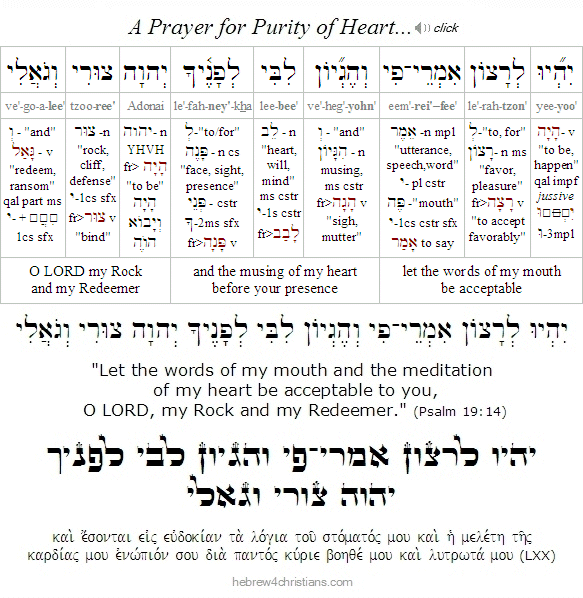 |
Love Believes all things...
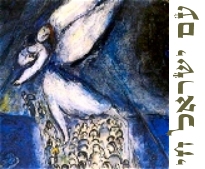
04.12.23 (Nisan 21, 5783) "I would have fainted unless I believed to see the goodness of the LORD..." (Psalm 27:13). Faith is therefore self-authenticating: as you trust in the good, the good will be revealed: believe to see! As Yeshua said, "According to your faith be it done unto you" (Matt. 9:29). And if it is faith that makes you whole, then its lack makes you sick... As you doubt, so you will lose sight of what is real, true, and abiding. Being cynical is cowardly: "There are two ways to be fooled. One is to believe what isn't true; the other is to refuse to believe what is true" (Kierkegaard). The cynic refuses the possibility of truth because he is afraid of being fooled, and for this fear he willingly closes his eyes to the good. "Believe that life is worth living, and your belief will help create the fact" (James).
When we trust God's promises, we affirm an unseen good even if the present hour is shrouded in darkness. Faith sees beyond "the seen" to the unseen (2 Cor. 4:18). The "seen" is not ultimately real, and consequently faith is exiled from the vanity of the present hour (עולם השקר). Therefore affirm your faith, dear friend; do not allow your heart to waver. Refuse the darkness of fear by choosing to believe in the reality of God's love for your soul, despite the mess you've made of your life. Affirm that God's love is more real, more substantive, and more valuable than anything disclosed in this world that fades away. Amen.
Hebrew Lesson
Psalm 31:19a reading (click):
The Meaning of Freedom...

04.11.23 (Nisan 20, 5783) Passover is sometimes called zeman cheruteinu (זְמָן חֵרוּתֵנוּ), the "Season of our Freedom," though it's important to understand what that means. Some people think that "freedom" means "licentiousness," or the ability to do what they want to do whenever they want to do it. However, simply doing whatever you want to do is not the Torah's idea of freedom. Yeshua told us "whoever commits sin is the slave (δουλος) of sin," and went on to say "if the Son sets you free, you will be free indeed" (John 8:34-36). True freedom (i.e., cherut: חרוּת) is therefore moral and spiritual rather than merely physical. Real freedom has to do with the power to choose what is right and good, not to simply get your own way or to practice your lusts... Our deliverance is meant to clothe us with divine power to walk in righteousness and truth (see Titus 2:11-14; Titus 3:8; Phil. 2:14-16).
True freedom is in agreement with the truth of God's law. Where it is written, "The tablets (of the Ten Commandments) were the work of God, and the writing was the writing of God, engraved (חרות) on the tablets" (Exod. 32:16), the midrash says do not read the word as "engraved (i.e., charut: חָרוּת) on the tablets" but rather as "freedom (i.e., cherut: חֵרוּת) on the tablets," since only those who obey God's will may rightly be called "free" people. Amen. "Blessed are they who observe justice, who do righteousness at all times" (Psalm 106:3).
Hebrew Lesson
Psalm 119:77 reading (click):
Returning to the LORD...
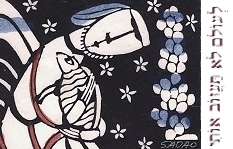
04.11.23 (Nisan 20, 5783) The only way we can draw near to God is if we believe that He is near to us, personally, intimately... "Behold I stand at the door and knock" (Rev. 3:20). Faith "hears the knock" as God's desire to draw near... faith hears his voice and opens the door to his presence; faith believes to partake in his communion.... "Draw near to God and he draws near to you" (James 4:8). The Hebrew word karov (קרוב) is translated using engidzo (ἐγγίζω) in New Testament Greek, a word that means to come close and touch... When we draw close to God, we reach out and find God holding us. Our "I" melts away as we cling to God as our dear life; we become one with his heart; we lose ourselves to find ourselves.
Hebrew Lesson
Zechariah 1:3b reading (click):
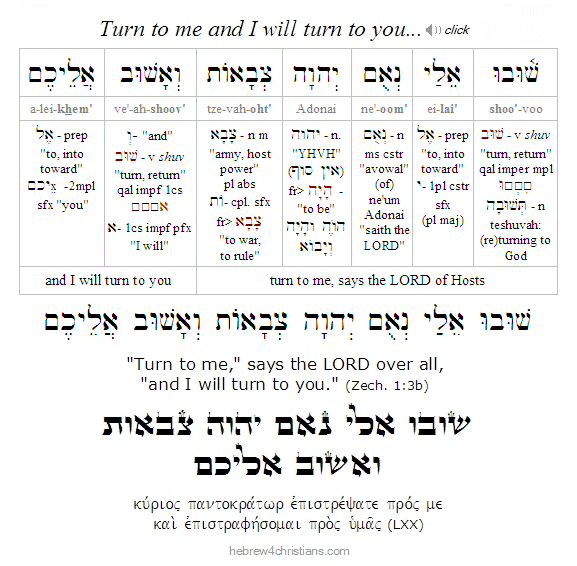 |
"Turn to me, and I will turn to you..." (Zech. 1:3). Someone might wonder why we must take the initiative, yet that is because God has never turned away from us; he has always been the one who loves us most of all and awaits our return to his love.... "Turn to me and you will discover that I have never left you nor forsaken you."
Yeshua illustrated the idea of teshuvah (i.e., תְּשׁוּבָה, "returning to God") by telling the famous story of the "prodigal son" (Luke 15:11-32). After selfishly squandering his father's inheritance, a wayward son decided to return home, full of shame and self-reproach. "But while he was still a long way off, his father saw him and was filled with compassion for him; he ran to his son, threw his arms around him and kissed him." The father then ordered a celebratory meal in honor of his lost son's homecoming. When his older brother objected, the father said, "We had to celebrate and be glad, because this brother of yours was dead and is alive again; he was lost and is found."
This parable reveals that teshuvah ultimately means returning (shuv) to the outstretched arms of your Heavenly Father... God sees you while you are still "a long way off" (Rom. 5:8). He runs to you with affection when you first begin to turn your heart toward Him. Indeed, God's compassion is so great that He willingly embraces the shame of your sins and then adorns you with "a fine robe, a ring, and sandals." Your Heavenly Father even slaughters the "fattened calf" (Yeshua) so that a meal that celebrates your life may be served....
 |
Teshuvah and Sanity...

04.11.23 (Nisan 20, 5783) It is written in our Scriptures (2 Tim. 1:7) that "God has not given us the spirit of fear (πνεῦμα δειλίας), but of power, and love, and a sound mind" (note that the term "sound mind" comes from the word saos (σάος) "safe," or under the protective restraining influence of the Spirit of God). Understand the connection between fear and confusion, then, and note further the connection between having a sound mind and a heart of peace and courage (Isa. 32:17)... A fearful or shameful attitude, then, enervates your resolve, quells your love, and introduces pain to your thinking. It is the old ruse of the enemy of our souls to lead us to despair, the exile of shame, and cruel bondage to untruth. As always the answer is the same: namely, teshuvah, turning to God and embracing the grace and love given in Yeshua as our deepest reality, our power, our heart, and our mind.
Hebrew Lesson
Isa. 32:17 Hebrew reading (click):
Being Born Again...

04.10.23 (Nisan 19, 5783) Yeshua taught that we discover the truth about spiritual reality by way of revelation from heaven, not by way of human reasoning. He said that we can come to know God only through the revelation of Him: "No one has ever seen God; the only God (μονογενὴς θεὸς), who is at the Father's side, he has made him known" (John 1:18).
For example, when a religious leader named Nicodemus visited Yeshua to inquire who he was, Yeshua redirected the inquiry by asking what sort of man he was instead (John 3). Nicodemus was impressed with the reports of miracles ascribed to Yeshua and supposed that he was some sort of teacher sent from God. Yeshua, however, abruptly told him that unless he was "born from above" he would be unable to see the truth of the kingdom (John 3:3). He explained that no one can see the hidden kingdom of God apart from a spiritual "rebirth," that is, a new mode of being that enables the person to enter another realm of existence altogether. Such transformation comes by means of the agency of God's Spirit, that is, by an encounter with God that imparts heavenly life (רוח) to the soul.... Once that happens, the person is able to receive the truth of heavenly things.
Nicodemus objected to the idea of being "born again." "How can a man be born when he is old? He cannot enter his mother's womb and be born a second time, can he?" Perhaps he was suggesting that spiritual rebirth would be as impossible as physical rebirth. People are just too set in their ways to change... Yeshua reminded him of the distinction between the realm of the natural ("born of water") and the realm of the spirit ("born of the Spirit"): "That which is born of the flesh is flesh, and that which is born of the Spirit is spirit. Do not marvel that I said to you, 'You must be born again.' The wind (ruach) blows wherever it will, and you hear the sound it makes, but do not know where it comes from and where it is going. So it is with everyone who is born of the Spirit." When Nicodemus still expressed uncertainty about all this by asking "How can these things be?" Yeshua chided him for his shortsightedness: "If you don't believe when I explain in earthly terms, how will you believe if I tell you about heavenly things?" As a respected teacher of Torah, Nicodemus should have known the prophetic teaching of "rebirth" from the Scriptures, such as Ezekiel 36:25-28, Jeremiah 31:33; and indeed he had a responsibility to know this truth. Moreover the general theme of Scripture concerned the coming of Messiah, the Son of Man, who would undo the curse that befell humanity through Adam's transgression, and this meant a new beginning...
To help Nicodemus see, Yeshua reminded him of the episode recorded in the Torah when the people became discouraged about the journey in the desert. At one stop they could not find water and they began to say that the LORD had abandoned them to die there (see Num. 21:4-9). God then sent "fiery serpents" (הַנְּחָשִׁים הַשְּׂרָפִים) that bit the people and many began dying. When the people cried out in distress, God instructed Moses to make a semblance of a fiery serpent and to lift it up on a stake, so that everyone who was bitten could look upon it and live. Yeshua then made the connection for Nicodemus: "Just as Moses lifted up the serpent in the desert, so the Son of Man must be lifted up: so that whoever believes in Him would not perish but have eternal life" (John 3:14-15).
The episode in the desert provides a vivid picture of deliverance for all who have likewise come under divine judgment. The lifted up serpent was an sign of righteous judgment; the people were entirely unable to rescue themselves, and the venom was lethal and without antidote. Only God could save them, and God's way of healing was to have the people look at the impaled serpent to receive life. Only God's power could kill the power of death's hold over them... When Yeshua told Nicodemus that he likewise would be "lifted up," he used the same word used elsewhere to refer to crucifixion (ὑψόω). "Looking at" God's provision for deliverance at the cross is the means of salvation -- that is, the greatest blessing of all: healing from our separation from God, deliverance from the judgment for sin, and the promise of eternal life. Again, all this comes by faith: "looking at" God's remedy means accepting it as being offered for your sake. You are set free from condemnation, you receive newness of life, and you are able to live before God in honesty and confidence of his love for you...
"Unless you are born again, you cannot see the kingdom of God." You are blind until God opens your eyes. When Yeshua gave sight to a man born blind, the Pharisees concluded that he could not be a true prophet of God because he healed someone on the Sabbath day (John 9). In response Yeshua said, "For judgment I came into this world, that those who do not see may see, and those who 'see' may become blind." When the Pharisees heard this they asked, "Are we blind then?" and Yeshua replied: "If you were blind, you would not be guilty of sin, but now because you claim that you can see, your guilt remains." Likewise the Apostle Paul was made blind in order to see; he had to lose the blindness of his seeing in order to behold the truth of God's kingdom (Acts 9). As long as Paul thought he could see he remained blind, but as soon as he realized he was blind, he began to be able to see...
The difference between believers and unbelievers does not turn on the problem of sin and the condition of spiritual death - for both are in the same helpless state before God - but rather with the different responses they have toward "the light," that is, the revelation of God manifest in Yeshua. Those who love evil hate the light and turn away from its disclosure, whereas those who "do truth" love the light so that their deeds are revealed as God's power at work within their hearts (John 3:19-21; Eph. 5:13). There is an "exclusive disjunction" in the realm of the spirit: either you will love what is evil and hate the light, or you will love the light and hate what is evil. "No one can serve two masters, for either he will hate the one and love the other, or he will be devoted to the one and despise the other" (Matt. 6:24).
In the end there will be found two types of people: those who love the truth and those who love the lie. These are the children of light (בְּנֵי הָאוֹר) and the children of darkness (בְּנֵי הַחשֶׁךְ), respectively. Followers of Yeshua the Messiah are told to "walk as children of light" / ὡς τέκνα φωτὸς περιπατεῖτε (Eph. 5:8). The children of light are called to be am kadosh - a holy people - separate from the evil engendered by the fallen world and its forces, just as the very first creative expression of God was the separation of light from darkness (Gen. 1:3-4). The children of light "hate evil and love the good," and conversely, the children of darkness "hate the good and love evil" (Psalm 34:21, Prov. 8:13, Amos 5:15, John 3:20-21). Regarding the heavenly Zion to come, it is written: "nothing ritually unclean will ever enter into it, nor anyone who does what is detestable or practices falsehood (lit. "makes a lie"), but only those whose names are written in the Lamb's book of life" (Rev. 21:27).
The essential question is whether you are willing to believe in the light of God's love, or not... What will you choose to believe, after all? Yeshua is the light of the world, and those who follow him will not walk in darkness, but will have the light of life (John 8:12). So, do you have ohr ha-chayim (אוֹר הַחַיִּים), "the light of Life," shining within your heart? The light beckons: "wake up, open your eyes, and believe" the good news: darkness and despair will not prevail; your mourning will find comfort, your grief its solace. Your heart's deepest longing shines brightly, even now, if you will but believe... Now may you find courage and remember what is written: "The LORD is my light and my salvation (i.e., my Yeshua); whom shall I fear? The LORD is the refuge of my life; of whom shall I be afraid?" Amen.
Hebrew Lesson
Psalm 27:1 reading (click):
All things made new!

04.10.23 (Nisan 19, 5783) Some people attempt to provide empirical "proof" of the resurrection of Yeshua, though strictly speaking this will always be insufficient. After all, the very guards at the tomb who witnessed the sight of the angel rolling away the stone later conspired with the religious establishment to suppress the message of the resurrection (Matt. 28:2-4, 11-15). Even Yeshua said that personally witnessing someone coming back from the dead would be insufficient for teshuvah (Luke 16:30-31). No, we do not see the resurrection of Yeshua through the eyes of the flesh, but rather through the eyes of faith. We believe in order to see; not the other way around...
Empirical evidence at best provides a sense of logical "probability," but faith is a life-and-death matter of the heart, soul, and mind... Only the inward testimony of the Holy Spirit (i.e., argumentum Spiritus Sancti), can "drag" the sinner to the confess the reality of the risen Yeshua, and once His Living Presence is encountered, categorically everything changes and nothing will remain the same forever. He makes all things new! (2 Cor. 5:17).
Hebrew Lesson
Isa. 43:19a reading (click):
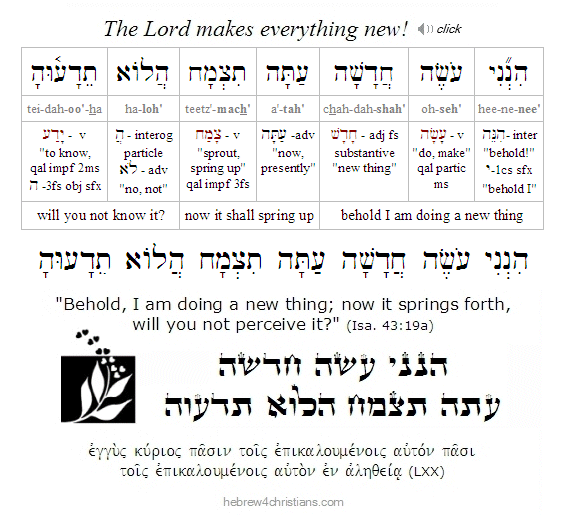 |
Countdown to Shavuot...
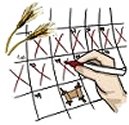
04.10.23 (Nisan 19, 5783) In the Torah we are instructed to count forty nine days – seven weeks of days – from the day following Passover until Shavuot (i.e., Weeks or "Pentecost"). This period of time is called Sefirat HaOmer (ספירות העומר), or the "counting the [barley] sheaves" (see Lev. 23:15-16; Deut. 16:9). In abstract terms, it's as if there is a dotted line pointing directly from Passover to Shavuot - a "Jubilee" of days - representing the climax of Passover itself. The early sages identified this climax as the revelation of the Torah at Sinai (which indeed did happen exactly 49 days after the Passover in Egypt), but the New Testament identifies it as the outpouring of the Holy Spirit (רוח הקודש) that ratified the reality of the New Covenant of God at Zion. The redemption process that began at Passover was therefore completed at Shavuot, and that "completion" was the revelation of God's love and deliverance for the entire world. And though the Jewish sages did not fathom the use of the otherwise forbidden leaven in the offering (see Eph. 2:14). The countdown to Shavuot therefore goes beyond the giving of Torah at Sinai and points to the greater revelation of Zion. Shavuot is the fulfillment of the promise of the Holy Spirit's advent to those who are trusting in Messiah (Acts 2:1-4). "Counting the Omer," then, is about receiving the Holy Spirit to experience and know the resurrected LORD of Glory. You can "count" on that, chaverim!
In this connection it is important to understand that the climax of the 49 days was not the giving of the law at Sinai (i.e., matan Torah), but rather the revelation of the altar (i.e., the"Tabernacle") and its subsequent fulfillment in the sacrificial death of Yeshua as our Lamb of God. Moreover, it was during this time that Yeshua made His post-resurrection appearances to His disciples and indeed ascended to heaven during this period... Of particular importance is 1) the beginning of the count of the omer since it signified the waving of the firstfruits and therefore the resurrection of Yeshua (1 Cor. 15:20); 2) the 40th day of the Omer (Mem B'Omer), when Yeshua ascended back to heaven, and 3) the climactic 49th day of the Omer (Shavuot) when the Holy Spirit was given to the disciples in fulfillment of the promise that we would not be left comfortless (Acts 2:1-4). Shavuot, then, marks the time of "Jubilee" of the Spirit, when are clothed with power to serve the LORD without fear...
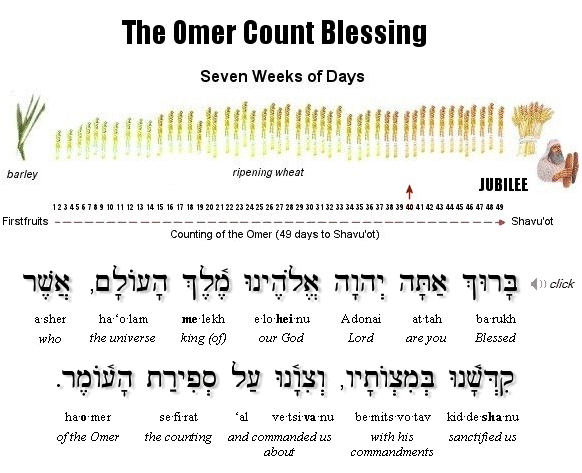 |
It can feel a bit overwhelming when you consider how the spring holidays of Passover, Unleavened Bread, Firstfruits, and the Omer Count overlap on the Torah's calendar. And it is always a bit difficult explaining the interrelationships between the holidays as well:
Hebrew Lesson
Psalm 47:5 Hebrew reading:
Why do some start the Omer Count earlier than others?
It depends on how you read מִמָּחֳרַת הַשַּׁבָּת, "the day after the Sabbath" (Lev. 23:15). If you interpret "the Sabbath" to refer to the Sabbath of Passover you will have one start day, but it you regard the Sabbath to refer to the weekly Sabbath, you will have another... This is sometimes called the "Omer Controversy." For more on this subject, see the article: "Sefirat HaOmer: Counting the Sheaves to Shavuot."
The Fight for Love...
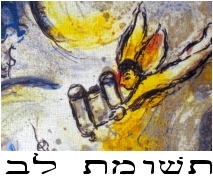
04.10.23 (Nisan 19, 5783) "Whatever does not proceed from faith is sin" (Rom. 14:23). This teaches us that sin is not so much disobedience to an external code of behavior as it is abandoning your trust, your identity, and your hope as a beloved child of God. As you believe so you will behave, and as you behave so you believe... Therefore the greatest of sins is to forget the truth of who you really are – a beloved and redeemed child of God! The great temptation of sin is rooted in the lie that we are unworthy people, that God does not really loves us (just the way we are), that He is disappointed in us, and so on. "Self-rejection is the greatest enemy of the spiritual life because it contradicts the sacred voice that calls us the "Beloved." Being the Beloved constitutes the core truth of our existence" (Nouwen). Forgetting who you are leads to forgetting who the Lord is, just as forgetting who the Lord is leads to forgetting who you are.... Therefore the Lord constantly tells us to remember and not to forget the call of his heart, the message of his love.
Sin seduces people to destroy themselves, since it first of all seeks to disown, impugn, and reject what is most important for spiritual life. The devil seeks to murder and destroy all that we need to be eternally healed... And though we might want to escape from this conflict (or to pretend that it's not really here), the battle is intractably real and must be fully engaged until our redemption is complete (1 Pet. 5:8-9). Meanwhile, spiritual struggles can be downright ugly. Would any one deny that the cross of Messiah was a sacred space - and yet it was precisely from there, from the place of blood and suffering and pain and terror, that the grace, beauty, and strength of God for us would shine forth.
To effectively combat the devil, let us first of all pray to the LORD God Almighty and ask for His power, wisdom, and grace to deal with the evil one's devices and strategies used against us (Eph. 6:11-18; Rom. 13:12, 1 Thess. 5:8; 2 Cor. 10:4-5). Since we are not to be ignorant of the devil and his devices (2 Cor. 2:11), let us particularly ask God to remind us of who we really are in the Messiah, and to give us the power of the Holy Spirit to genuine walk in the truth of our sacred identity as his beloved. Let us ask God to help us practically apply the victory given to us in the resurrection of Yeshua. With God's help, may we be bold to take our place at His banqueting table, assured that we are indeed His dear children...
Hebrew Lesson
Proverbs 4:23 reading (click):
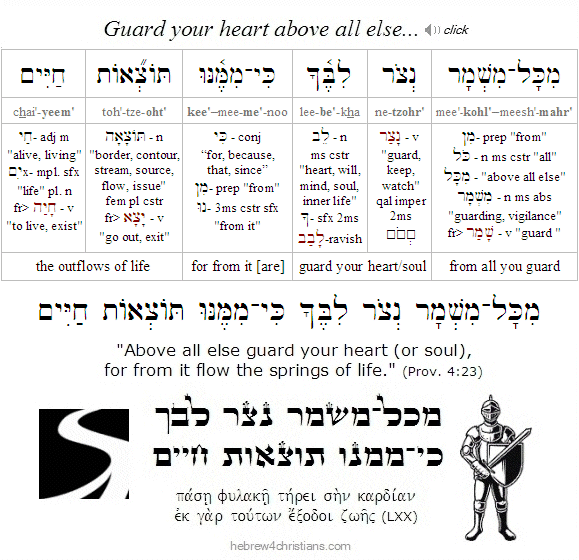 |
Love's Fear and Trembling...

[ During Passover week it is customary to read the ancient "love song" of King Solomon called Shir Ha-Shirim (שִׁיר הַשִּׁירִים), or the "Song of Songs." ]
04.10.23 (Nisan 19, 5783) The gospel reveals God's passion for us, the call of his heart, his desire to elevate us to the role of the beloved, and we respond by accepting Him as the great Lover of our souls, the "ultimate concern" of our life. Sin threatens to seduce us away from God's love, to interfere with our relationship, which evokes God's "jealousy" to protect love from loss.
It is written that "perfect love casts out fear" (1 John 4:18), but perfect love (τελεία ἀγάπη) must be "perfect," that is, reciprocal, complete, consummated, and alive with passion. In Hebrew, perfect love is "shalem" - that is, whole, healed, and unified (אַהֲבָה שְׁלֵמָה). Perfect love is both given and received... It is not "perfect love" to objectively simply accept that God loves you in Jesus. No, you must receive this as an inward passion, you must live within it, must embrace it, take possession of it, and let it fill your heart to abundance. This love, this "perfect love," then will cast away your fear of being unwanted, rejected, and abandoned. But to know this love, you have to open your heart and accept it as your own; you have to accept yourself as the beloved of God:
אֲנִי לְדוֹדִי וְעָלַי תְּשׁוּקָתוֹ
a·nee · le·do·dee · ve·a·lai · te·shoo·ka·to

"I am my beloved's, and his desire is upon me."
(Song 7:10)

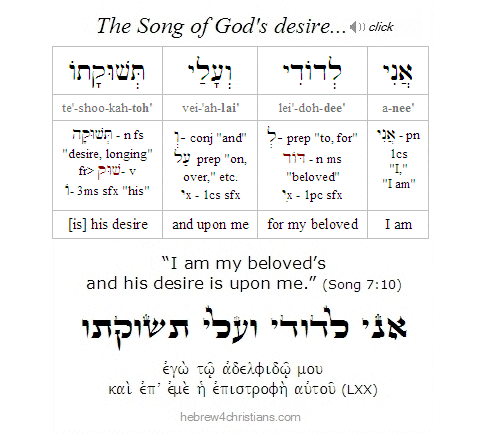
I realize the analogy of God as the great "Lover of our Souls" is ideal for most of us, and yet it is vital that we understand ourselves as the "beloved" of the Lord...
This week's Torah:
Parashat Shemini - פרשת שמיני
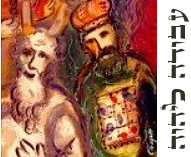
04.09.23 (Nisan 18, 5783) Happy Holidays, chaverim! This week's Torah reading (following Passover) is parashat Shemini ("eighth"), which continues the account of the seven-day ordination ceremony for the priests (as described earlier in Parashat Tzav). During each of these "seven days of consecration" Moses served as the first High Priest of Israel by offering sacrifices and training Aaron and his sons (i.e., the kohanim or priests) regarding their duties at the mishkan (i.e., "Tabernacle"). On the eighth day however, (i.e., Nisan 1), and just before the anniversary of the Passover, Aaron and his sons began their official responsibilities as Israel's priests. In the midst of the dedication, however, tragedy struck as Aaron's sons Nadav and Abihu took it upon themselves to make their own offering before the Holy of Holies of the tent. Since this was not the prescribed means of offering sacrifice, God considered the incense offered to be "strange fire" (i.e., esh zarah: אשׁ זרה) and both sons were tragically consumed by fire before the LORD (Heb. 10:29,31). Aaron was required to remain silent as his sons' bodies were removed by his cousins, and Moses then warned Aaron's two remaining sons, Eleazar and Ithamar, not to mourn during this sacred occasion.
The portion includes a list of animals, birds, fish and insects permitted as food, which subsequently provided the framework for Jewish dietary law (i.e., kosher law). The Israelites were permitted to eat any mammal that has both a split hoof and chews its cud (Lev. 11:3). Likewise, only fish that have both scales and fins were to be regarded as kosher. A list of acceptable (i.e., non-predatory) birds was given, along with the commandment not to eat any insects unless they have a pair of jointed legs used for leaping. The dietary laws were intended to sanctify the Israelites by separating them for holiness: "For I am the LORD your God. Consecrate yourselves therefore, and be holy, for I am holy" (Lev. 11:44).
Providentially considered, it is no coincidence that the inauguration of the Sanctuary is directly connected to the Passover, since the daily sacrifice of the Lamb (i.e., korban tamid: קרבן תמיד) presented an ongoing memorial of the great Exodus from Egypt. Indeed, consider that the central sacrifice of the Mishkan (i.e., "Tabernacle") was that of a defect-free lamb offered every evening and morning upon the altar in the outer court, along with matzah and a wine offering, signifying the advent of the true Passover Lamb of God given sacrifice for us. This is called "God's Food" in the Torah (Exod. 29:38-42; Num. 28:4-10; John 1:29).
Passover Seder pictures...
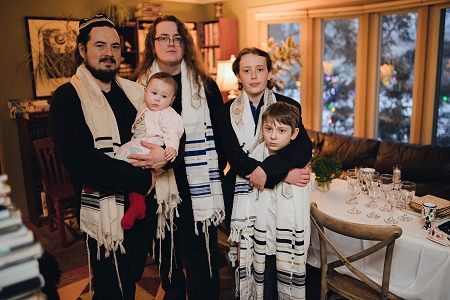
04.09.23 (Nisan 18, 5783) Shalom chaverim. We had a smaller-than-usual seder this year because many of our family members could not attend due to work conflicts, illness, and other reasons. But it was a great seder and it is always wonderful to retell the story of redemption together at this special time... Here are a few pictures of the occasion. You can view these in larger format on the Hebrew for Christians Facebook page (click here).
This changes everything!
The Resurrection of Yeshua...
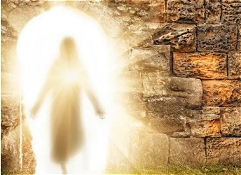
04.08.23 (Nisan 17, 5783) THE MOST IMPORTANT FACT OF ALL HISTORY - and that which radically transforms everything else - is the resurrection of Yeshua from the dead (תחייתו של משיח). Spiritual life means being awake to the risen reality and saving Presence of Yeshua, the One who Overcame and vanquished the power of death. Without Him we are hopeless; with Him we are more than conquerors (1 Cor. 15:14; Rom. 8:37). The resurrection means Yeshua is forever alive, and that today he hears your heart's cry. He is surely able to help you, and nothing can overthrow his invincible will. Our Lord suffered and died for your inner peace and healing, but now death has no hold over him, and he "ever lives to make intercession for you" (Rom. 6:9, Heb. 7:25). He is your compassionate Advocate (παράκλητος, lit. "one called alongside") who gives you heavenly comfort (1 John 2:1). Even more: The very power that raised Yeshua from the dead now dwells in you (Rom. 8:11). The miracle of new life is "Messiah in you - the hope of glory" (Col. 1:27). The Lord will never leave you nor forsake you (Heb 13:5): He "sticks closer than a brother" (Prov. 18:24); He sustains your way, and he will perfect the work of salvation on your behalf (Jude 1:24). In short, there simply is no "gospel" message apart from the resurrection! The resurrection is the victory of God's plan of salvation - His everlasting vindication over the powers of darkness - for your life.
Everything turns on whether we awaken to the risen Reality
and Presence of Yeshua in our lives...
The Talmud says "All the world was created for the Messiah" (Sanhedrin 98b). The New Testament had earlier said the same thing: "All things were created by Him (i.e., Yeshua), and for Him" and in Him all things consist (συνεστηκεν, lit. "stick together") (Col. 1:16-17). Indeed, all of creation is being constantly upheld by the word of the Messiah's power (Heb. 1:3). Creation begins and ends with the redemptive love of God as manifested in the Person of Yeshua our LORD... The Messiah is the Center of Creation - its beginning and end. As it is written: אָנכִי אָלֶף וְתָו רִאשׁוֹן וְאַחֲרוֹן ראשׁ וָסוֹף / "I am the 'Aleph' and the 'Tav,' the First and the Last, the Beginning and the End" (Rev. 22:13). "For from him and through him and to him are all things. To him be glory forever. Amen" (Rom. 11:36). Yeshua our Messiah is called מֶלֶךְ מַלְכֵי הַמְּלָכִים / Melech Malchei Hamelachim: The "King of kings of kings." He is LORD of all possible worlds -- from the highest celestial glory to the dust of death upon a cross. Yehi shem Adonai mevorakh (יְהִי שֵׁם יהוה מְברָךְ): "Let the Name of the LORD be blessed" forever and ever (Psalm 113:2). So while we can agree with the Talmud's general statement that the world was created "for the Messiah," we would insist that the name of the Messiah is none other than Yeshua, God's Son, and indeed, there is no other (Acts 4:12).
The heart of faith sees Elohei Yishi (אֱלהֵי יִשְׁעִי), the "God of my salvation," namely, the One who was and is and is to come (הַהוֶה וְהָיָה וְיָבוֹא) – the LORD our God Yeshua (Rev. 1:4;8; Isa. 41:4). The early Christian theologian Augustine of Hippo (354-430 AD) rendered Elohei Yishi as "God my Jesus," since "Jesus" (i.e., Yeshua) rightly means YHVH saves. Yeshua is the One who breathed life into the first Adam just as He is the One who breathes eternal life into those who are descended from Him, the great "second Adam."
Amen. He is alive, and we know this because of the testimony of Scripture, and because we also experience His glorious presence in our hearts. Shalom chaverim!
Hebrew Lesson:
Psalm 18:46 Hebrew reading:
Note: For more on this meditation, see the Techiyat Ha-Mashiach article...
The Life is in the Blood...
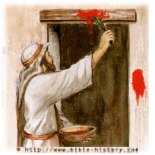
[ There is no Passover without the blood of the Lamb.... ]
04.07.23 (Nisan 16, 5783) The very first time the word "blood" (דָּם) occurs in the Scriptures concerns the death of righteous Abel, the son of Adam and Eve who was murdered by his brother Cain. After Abel's blood was shed, the LORD confronted Cain and said, "What have you done? The voice of your brother's blood (קוֹל דְּמֵי אָחִיךָ) is crying to me from the ground" (Gen. 4:10). Note the Hebrew word for blood here is written in the plural, signifying the loss of Abel's progeny as well. Since blood is the carrier of life, it bears the energy and vitality of life: it has its own spiritual "voice." Likewise, the blood of Yeshua (דְּמֵי יֵשׁוּעַ), the true Lamb of God who died upon the cross, speaks on our behalf, and reverses the power of death by creating a barrier that death can no longer cross, since the death of the sacrificial victim "exchanges" the merit and power of life.
Unlike the blood of Abel that "cries out" for justice, the blood of Yeshua cries out for life and mercy (Heb. 12:24). Putting our trust in the provision of God's sacrifice causes His wrath (or righteous judgment) to pass over while simultaneously extending eternal life and blessing to the sinner.... This is the essential message of the gospel itself, that we have atonement through the sacrificial death, burial, and bodily resurrection of Yeshua our Savior, the great Lamb of God. As Yeshua said, "I tell you the solemn truth, the one who hears my message and believes the One who sent me has eternal life (חַיֵּי עוֹלָם) and will not be condemned, but has passed over (i.e., μετά + βαίνω, lit., "crossed over" [עָבַר]) from death to life" (John 5:24). Just as God's judgment passes over from life to death on my behalf; so His love passes over from death to life on my behalf...
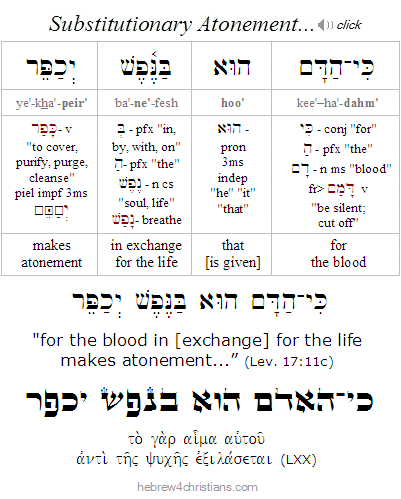 |
For more on this subject, see "Parashat Bo: The Life is in the Blood."
Getting ready for Passover Seder 2023
Passover's Love Song...

04.07.23 (Nisan 16, 5783) During Passover week it is customary to read the ancient "love song" of King Solomon called Shir Ha-Shirim (שיר השירים), or the "Song of Songs." In Jewish tradition, since Passover marks the time when our "romance" with God officially began, the sages chose this song to celebrate God's love for his people. And since Passover is also called Chag Ha-Aviv, the festival of spring, the Song is also associated with creativity and hope associated with springtime (Song 2:11-12). One way to read this poem is to see the king, who had disguised himself as a lowly shepherd to win the heart of the Shulamite woman, as a picture of Yeshua who took the form of a lowly servant to demonstrate his eternal love for those who are trusting in him... Indeed, the Song of Songs is linked to the "lilies" (i.e., shoshanim: שׁשׁנים) mentioned in Psalm 45, which presents a Messianic vision of the Divine Bridegroom and offers an "ode" for a forthcoming wedding.
אֲנִי לְדוֹדִי וְדוֹדִי לִי
הָרעֶה בַּשׁוֹשַׁנִּים
a·nee · le·do·dee · ve·do·dee · lee
ha·ro·eh · ba·sho·sha·neem

"I am my beloved's and my beloved is mine;
he pastures among the lilies."
(Song 6:3)
Download Study Card

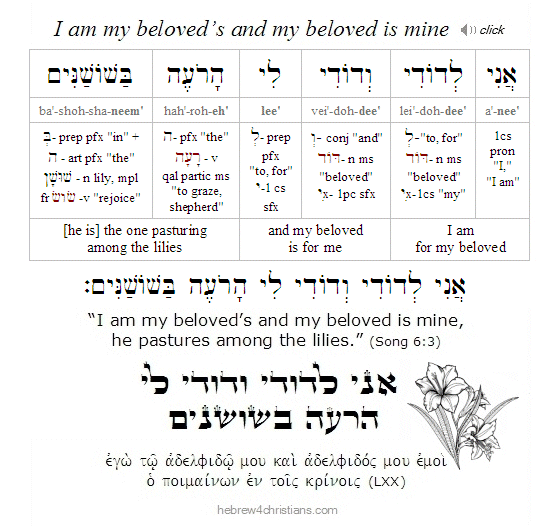
The essential meaning of Passover is of course rooted in the greatest love story ever told - about God, creation, the loss of Adam and Eve, the call of Israel, and the coming of the Messiah who would sanctify us as His own people, deliver us from the plague of death, and redeem us from the penalty of sin. Yeshua's mesirat nefesh ("giving over of soul" in sacrifice) and his triumph at the cross made the new covenant with God possible. As our Suffering Servant, He gave up His life for ours in exchange, redeeming us from the sickness unto death and making the way for our everlasting healing.
Whether or not you were able to attend a Passover Seder this year, please understand that there is always a place for you at His table. After all, Yeshua made a place for you within His heart when he died for you on the cross, and that is what Passover is really all about anyway. Pesach Sameach b'Yeshua, chaverim -- Happy Passover in Yeshua, friends!
Note: For more on the connection between Passover and the Song of Songs, see the article "Shir Hashirim: Passover and the Song of Solomon."
|










































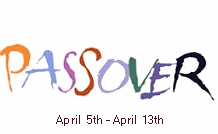

![Spring Holiday Timeline (H4C]](../../../../About_HFC/Site_News/Archive-2023/roshchodeshim-line.gif)
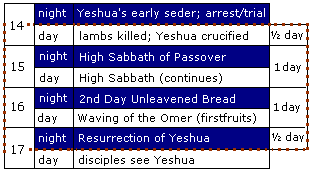



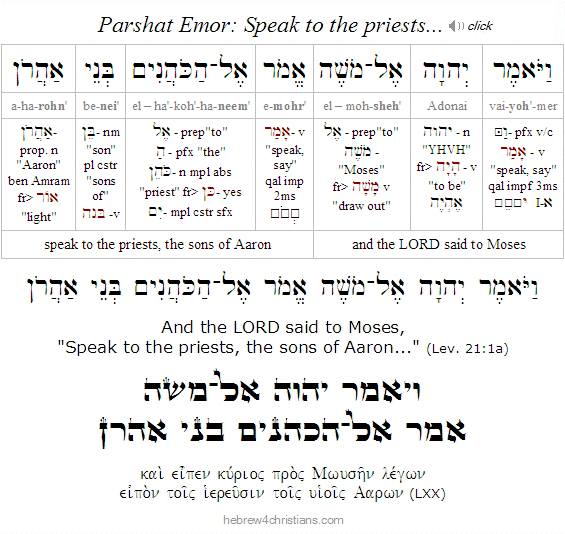
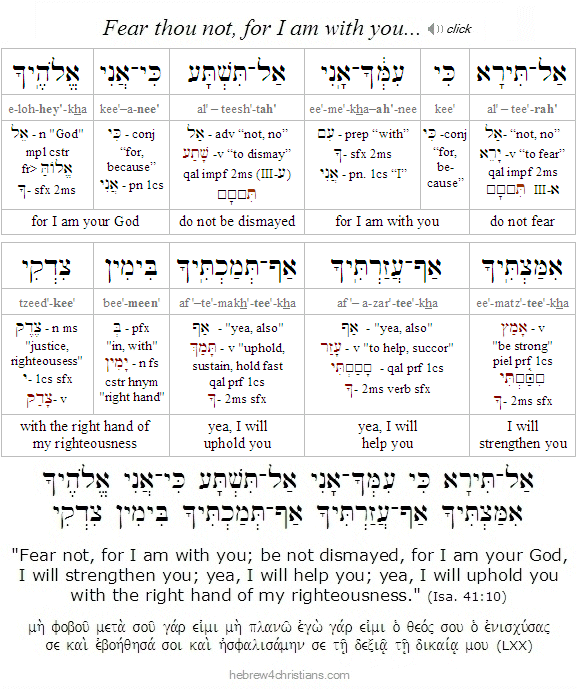
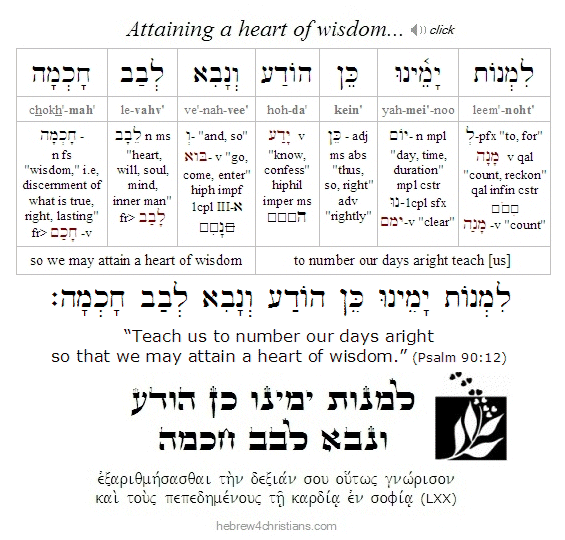




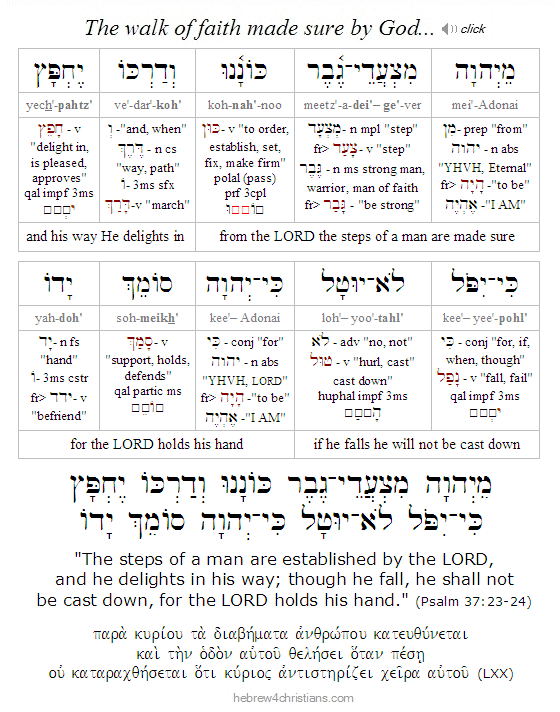
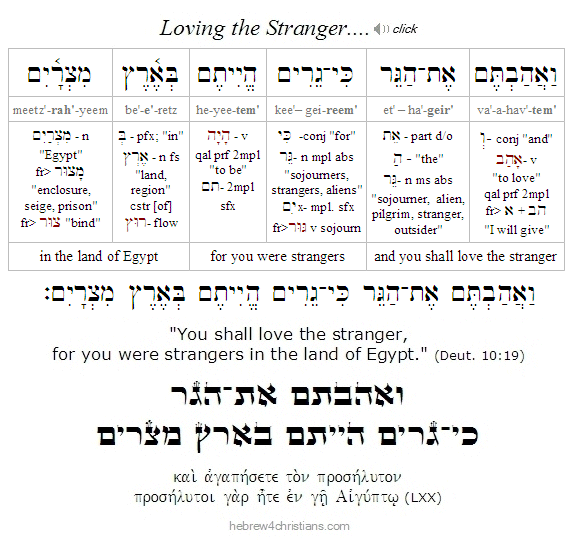
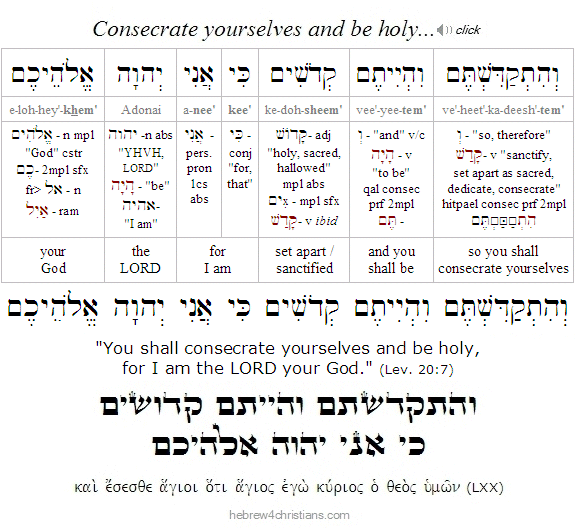


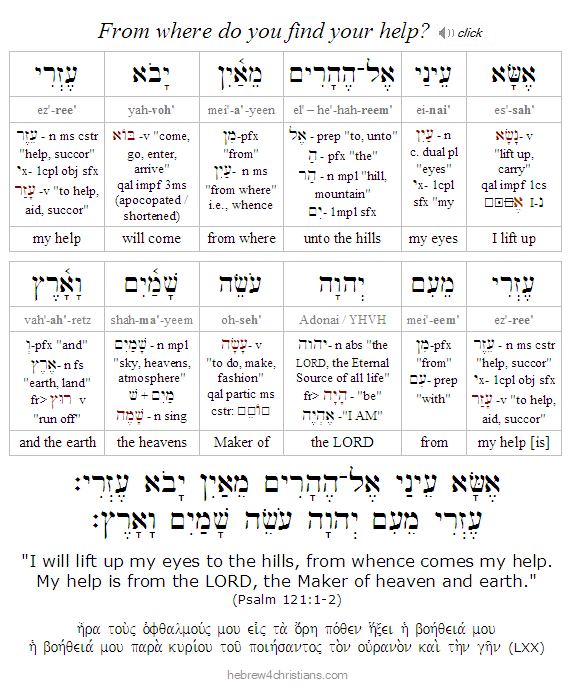


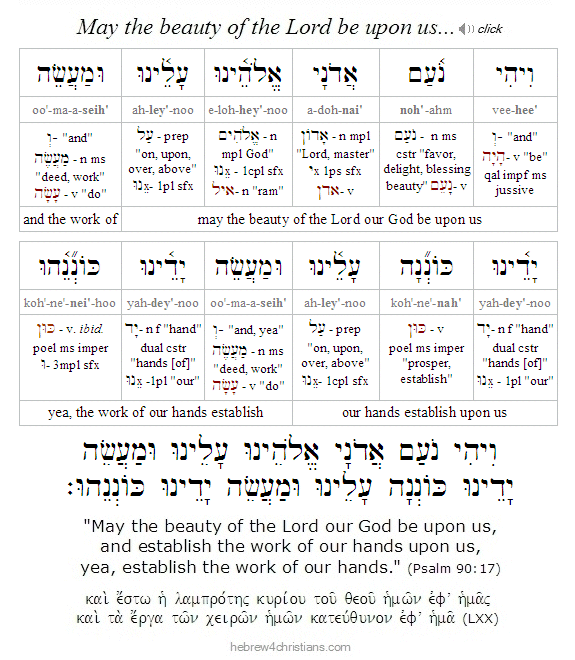
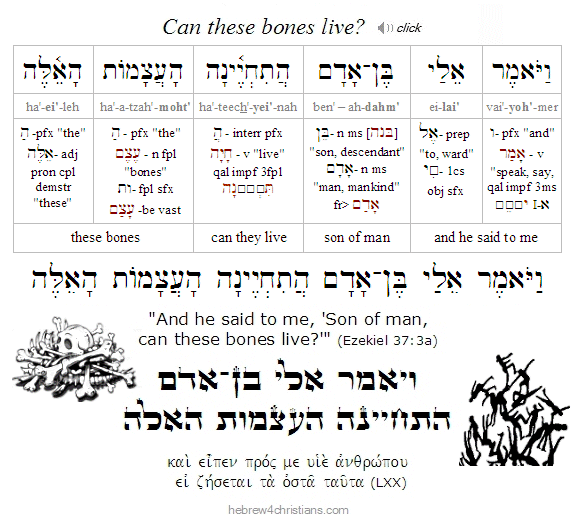
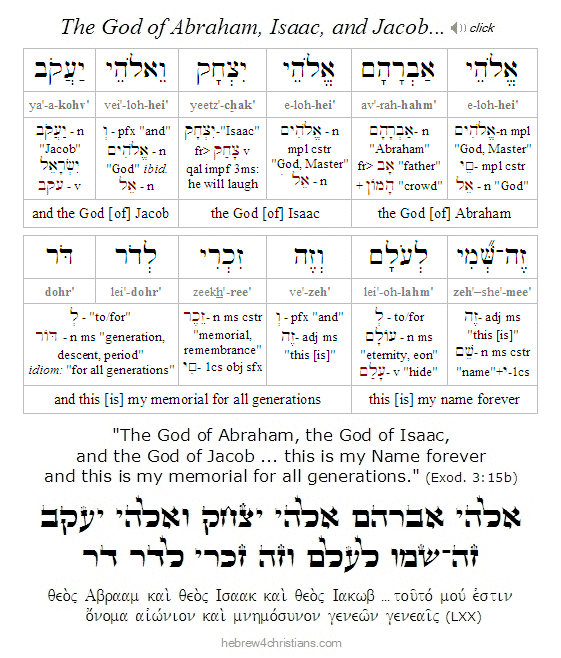
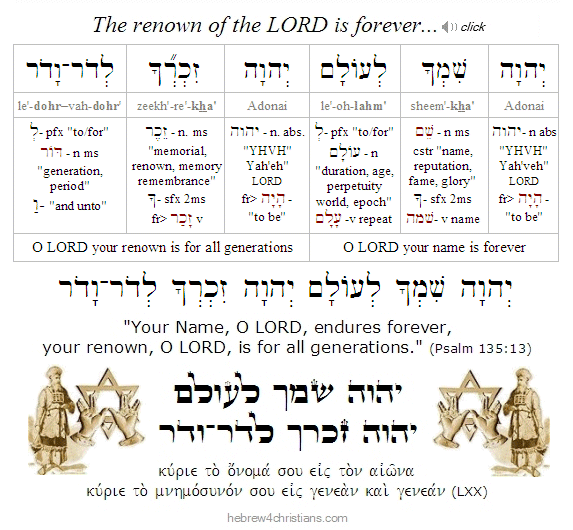


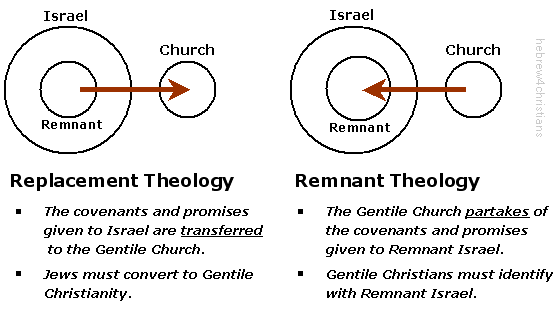
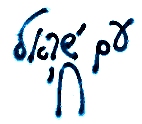
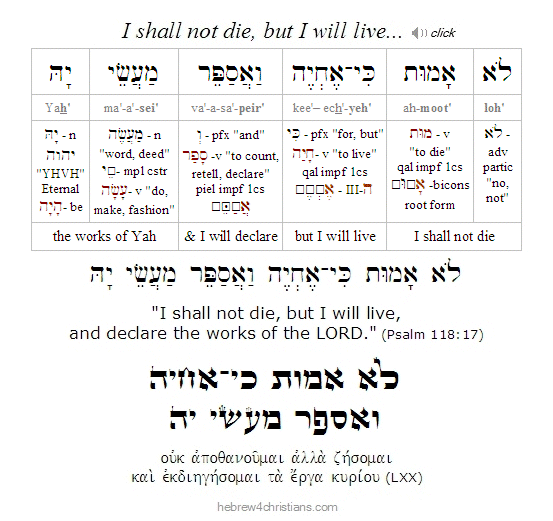
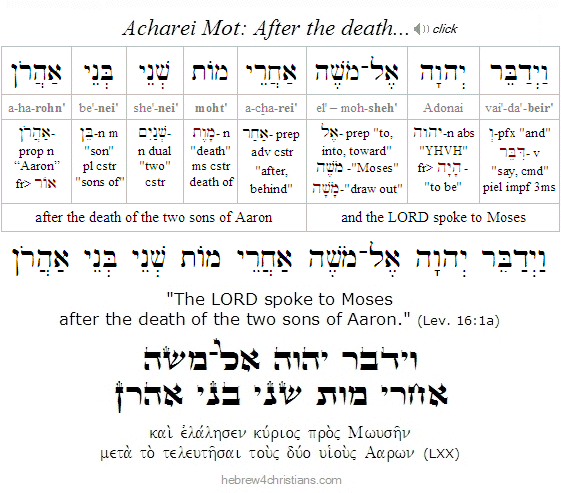

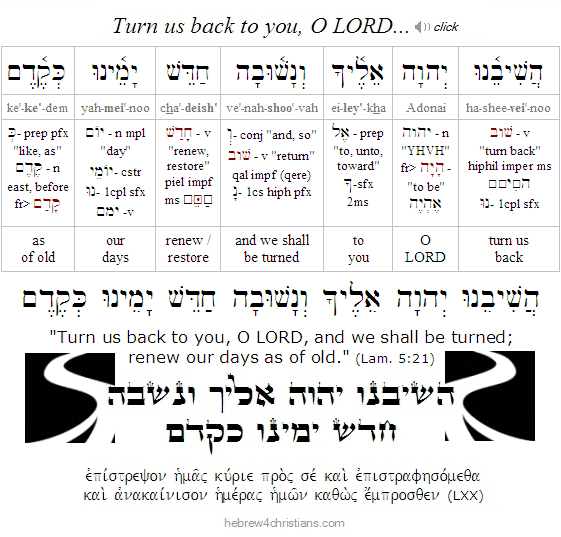



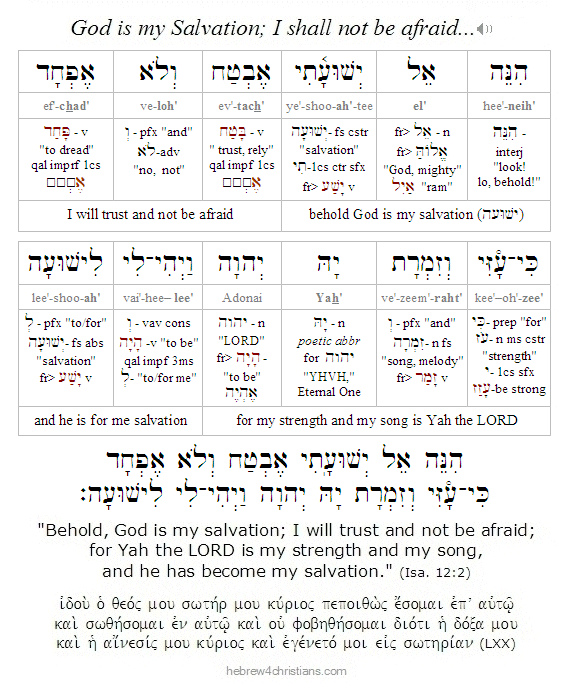

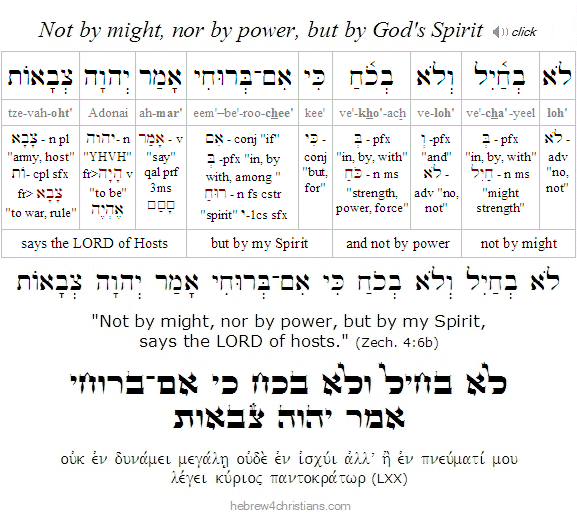
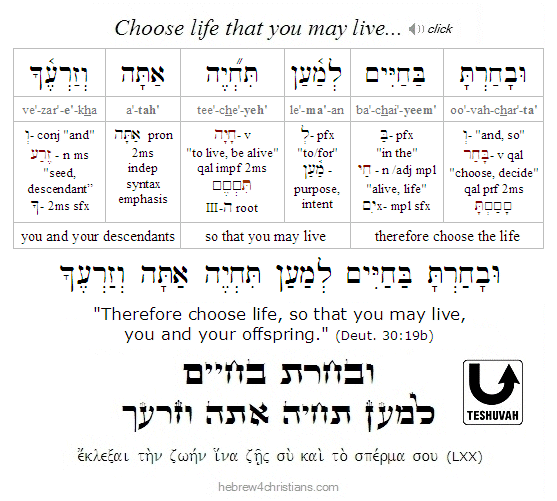

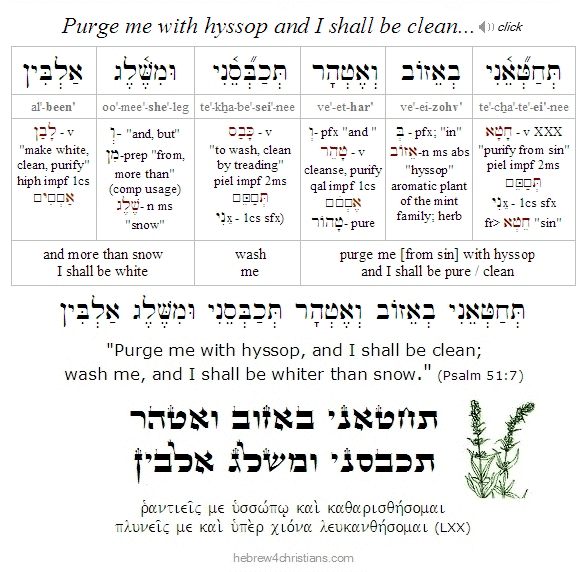





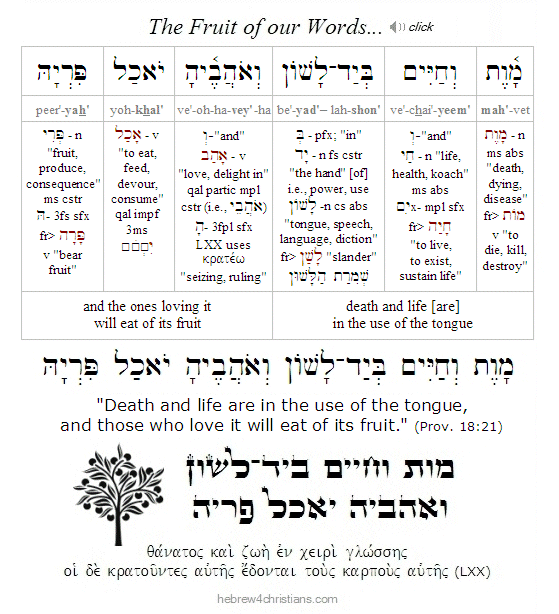

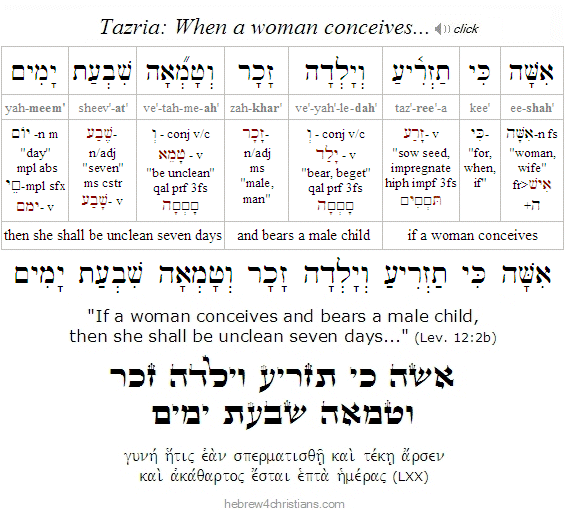
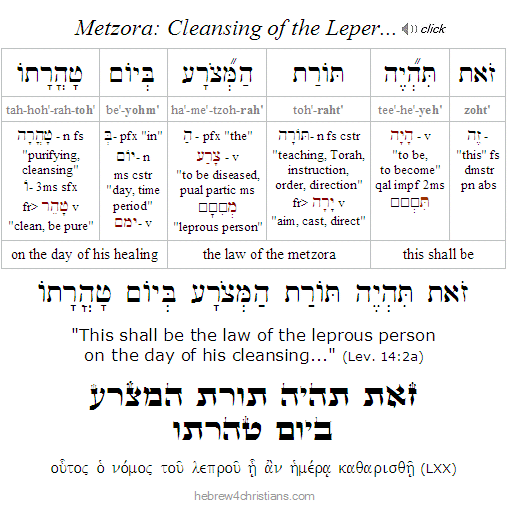


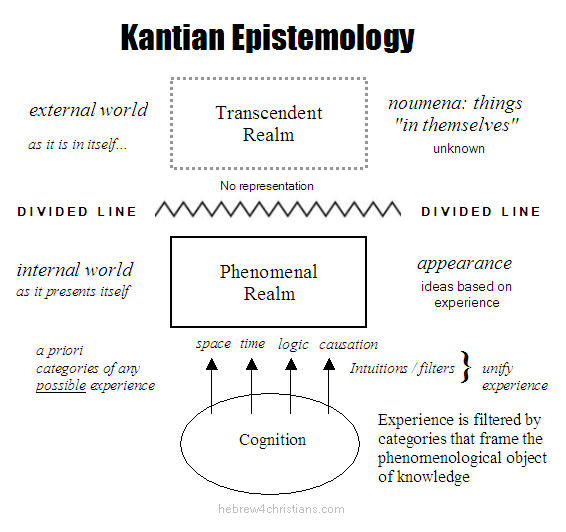


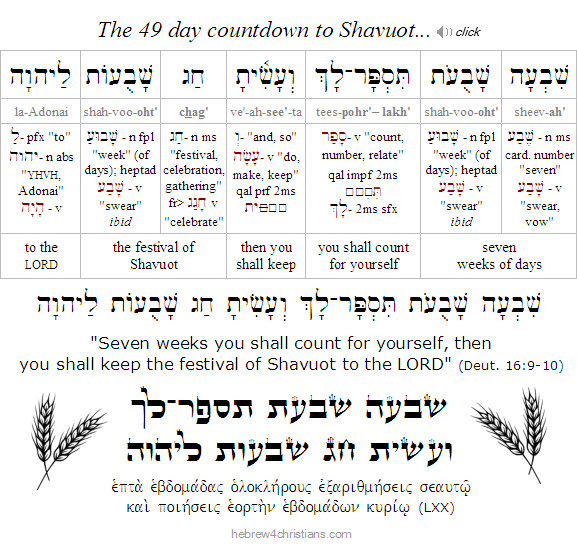
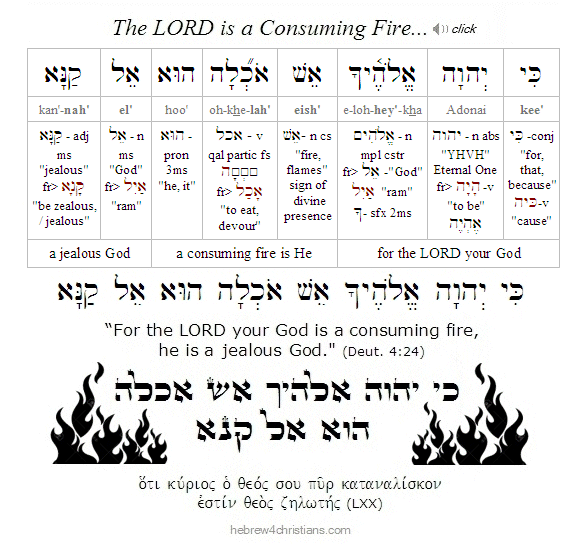


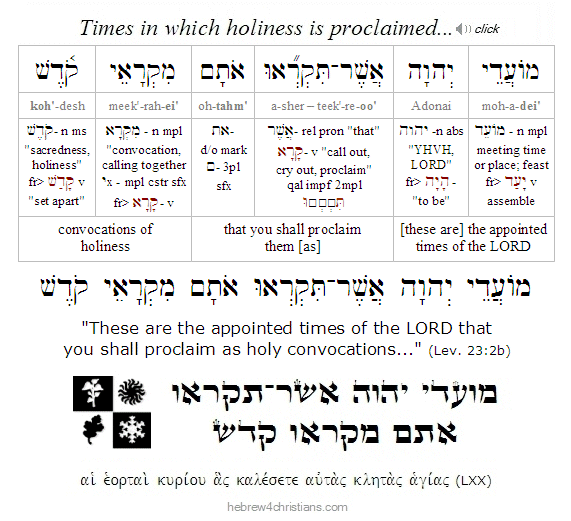



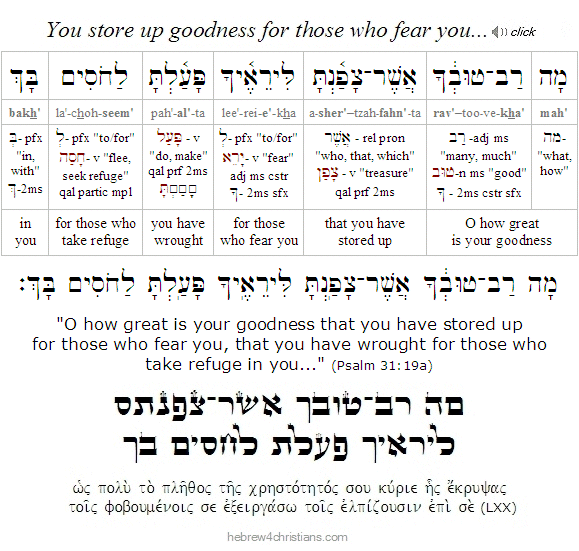
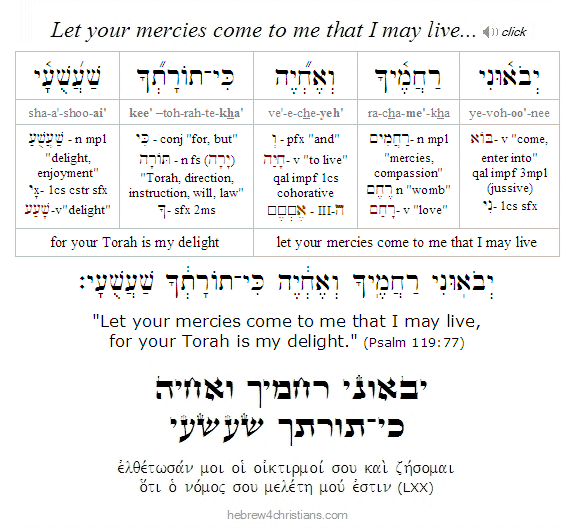


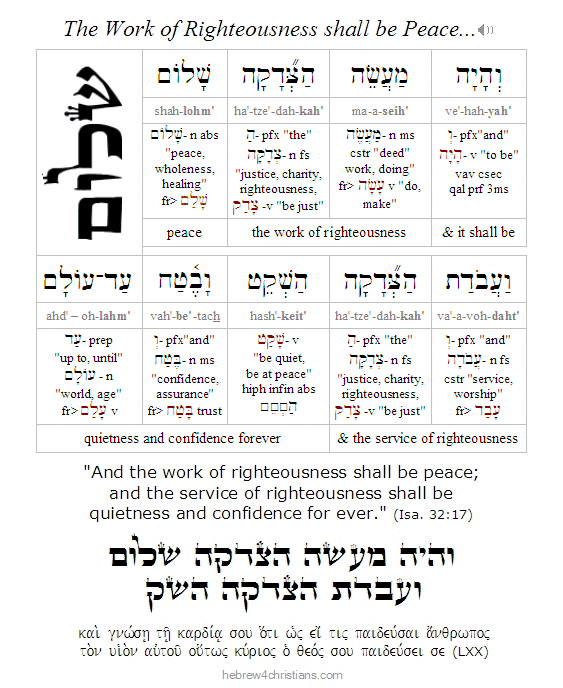
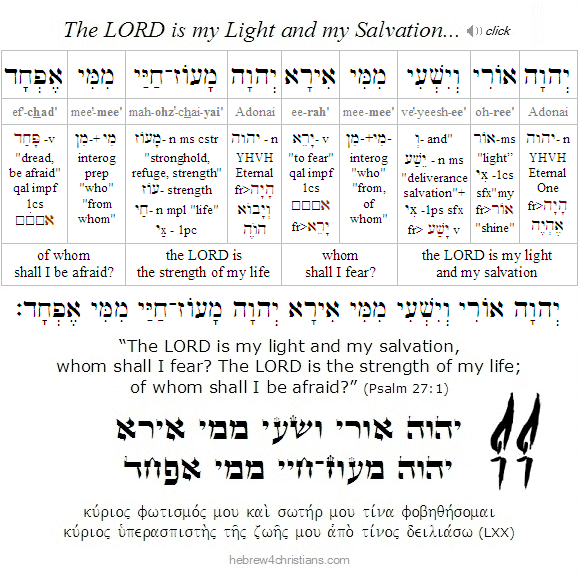



![Spring Holiday Timeline (H4C]](../../../../About_HFC/Site_News/Archive-2023/April/pesachline.gif)
